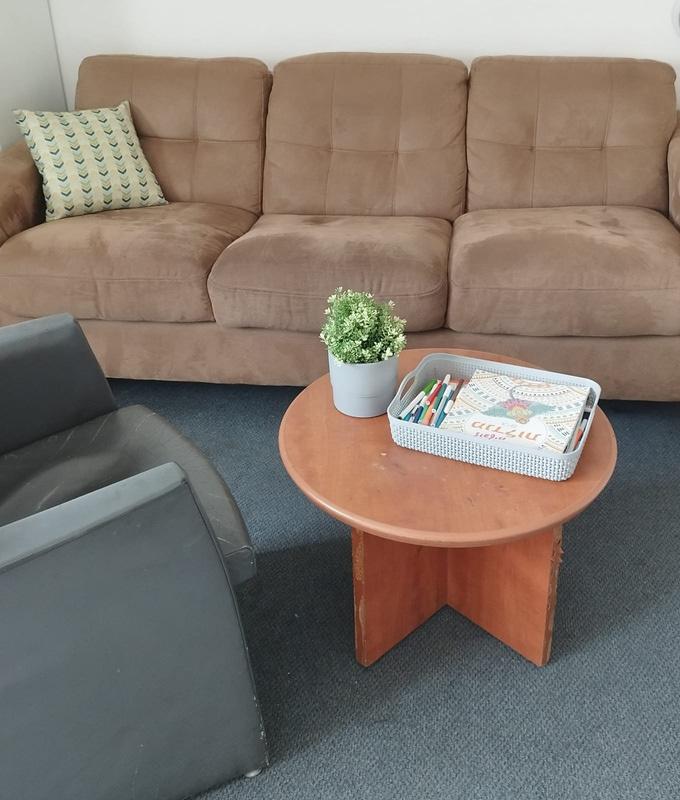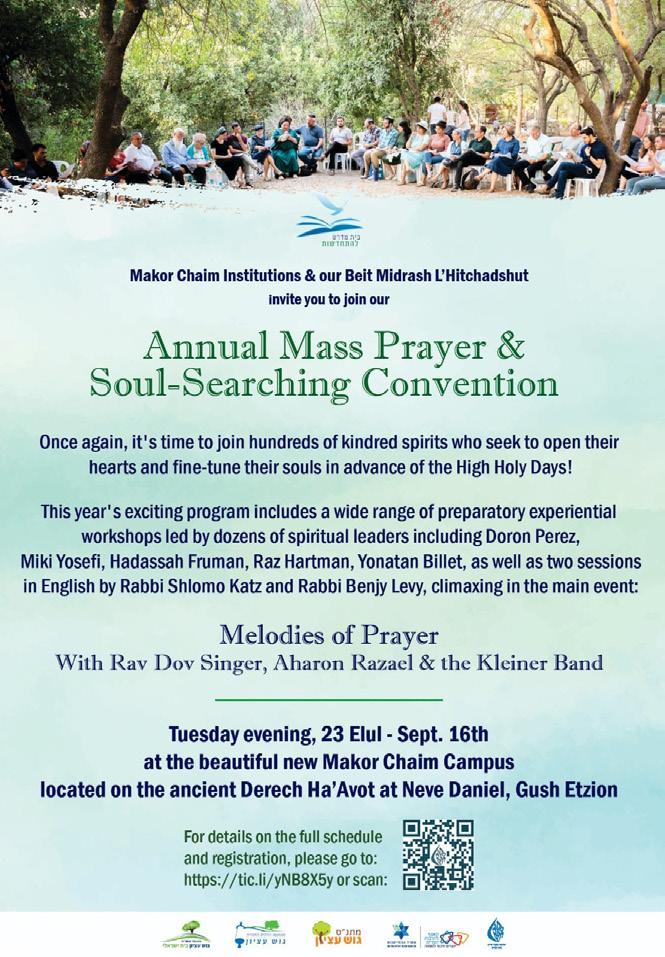Probing the Prophets
Rabbi Nachman Winkler
Page 16
School Days
Michal Silverstein
Page 72








Probing the Prophets
Rabbi Nachman Winkler
Page 16
School Days
Michal Silverstein
Page 72








Dear OU Parenting,
Following the recent string of terrorist attacks, my son, 11, has become veryanxious. I, ofcourse, have also been affected by all the loss and trauma. I’m not sure how much or how little to share with him in general and specifically regarding my own emotional experience. For example, should I try not to cry and be sad around him? T.R.


Michal Silverstein, MS
Dear T.R.
Thank you for asking this very relevant and timely question.
Adults as well as children are overwhelmed with emotions when they hear about a terrorist attack. When they become more frequent, the feeling of uncertainty and loss of control can create much anxiety. There are certain guidelines to keep in mind
For Sale:

when responding to children under these circumstances.
Firstly, it’s important to give children a safe space to speak, meaning a space to express them selves in the way that is natural for them. Some children don’t have much of a reaction and others will cry, show anger and frustration. They may say things that you don’t agree with or challenge you. Giving them the space to do this is crucial.
Next, when they ask questions, try to give them accurate information, answering only the questions they ask. Stay focused. It’s not necessary to elaborate or get sidetracked by politics or other similar situations. Explanations should be given in an age appropriate manner. Just like your rules are age appropriate your discussions should be as well.
Having more detailed, graphic conversations is more appropriate with an 18 than a 10 year old.
It’s important to keep an eye out for both emotional and physical signs of distress. If your child looks sad, has crying spells, becomes fearful or angry or is experiencing changes in sleeping and eating patterns, he may need extra help processing the current state of events. Be aware of behavioral changes.
Regarding your own emotional state, it’s important to model emotions in front of your children. Seeing youexpress your feelings

Dear Torah
Rabbi
Building
Rabbi
Aliya-by-Aliya
Rabbi
Probing
Rabbi
Letting Go
Rabbi
Recalling
Rabbi
Mitzvah
Rebbetzin
Group
Simchat
Rabbi
Ki
Rabbi
Rabbi

After a Breakup: Helping the Heart Get Ready Again
Aleeza Ben Shalom - Shagririm Balev
Remembering Rabbi Wein zt"l
Rabbi Joel Kenigsberg
Friendship, Community & Redemption
Mrs. Leah Feinberg
School Days
Michal Silverstein, MS
Torah 4 Teens by Teens
Yafit Atlas // Zvi Fisher
To view Rabbi Daniel Mann's and Rebbetzin Dr. Adina Shmidman's Divrei Torah please see: www.TorahTidbits.com > Individual Articles

COVER IMAGE From Menashe and Menucha Walsh
We recently moved here in Efrat (Hagefen area) from Hashmonaim where we made aliyah in 2006 from Sedgley Park Manchester with our now grown up daughters. The picture is taken in the entrance to our apartment which has a trellis which holds an old vine. The grapes on the vine in our home in Efrat remind us of God’s covenant blessing, as promised in the Land of Israel—a land of vines and abundance (Deuteronomy 8:8), a place where each family may dwell in peace under its vine and fig tree (Micah 4:4), and where the home itself becomes a sign of fruitfulness, like the fruitful vine within the house (Psalm 128:3). 60
KI TEITZEI Havdala Early Candles Havdala Early Candles 7:24 5:31 6:12 7:34 5:38 6:22
Yerushalayim/Maale Adumim 7:27 5:33 6:31 7:36 5:41 6:40
Ranges 11 days Wednesday - Shabbat
Sept 3 - 13 / 10 - 20 Elul
Ranges 11 days Wed–Shabbat
Oct x–x / x–x Cheshvan
Earliest Tallit and Tefillin 5:24-5:31 Sunrise 6:16-6:22
Beit Shemesh/RBS
Aza Area (Netivot, Sderot et al) 7:25 5:32 6:32
Gush Etzion
Mond/Herzliya/K.Saba
Modiin/Chashmonaim
Be’er Sheva
Petach Tikva
Haifa / Zichron
Gush Shiloh
/ Givat Shmuel
Zeev
/ Kiryat Arba 7:27 5:34 6:31 7:36 5:41 6:40 Ashkelon 7:26 5:33 6:30 7:35 5:40 6:39 Yad Binyamin 7:24 5:30 6:22 7:34 5:38 6:31
Tzfat / Bikat HaYarden 7:24 5:30 6:27 7:33 5:38 6:36 Golan 7:26 5:32 6:29 7:36 5:40 6:38
Nahariya/Maalot 7:25 5:31 6:28 7:34 5:39 6:38 Afula
Rabbeinu Tam (Jerusalem): Ki Teitzei 8:13 PM • Ki Tavo 8:04 PM
All Times According to MyZmanim (20 mins before Sunset in most Cities; 40 mins in Yerushalyim and Petach Tikva; 30 mins in Tzfat and Haifa)
All Times According to MyZmanim (20 mins before Sunset in most Cities; 40 mins in Yerushalyim and Petach Tikva; 30 mins in Tzfat and Haifa) Daf Yomi: Horayos 5
OU Kashrut
Synagogue/Community
MITCHEL R. AEDER, PRESIDENT OF THE ORTHODOX UNION Yehuda Neuberger, Chairman of the Board, Orthodox Union | Dr. Josh Penn, OU Kashrus Commission
RABBI MOSHE HAUER, EXECUTIVE VICE PRESIDENT | RABBI JOSHUA M. JOSEPH, ED.D. EXECUTIVE VICE PRESIDENT & CHIEF OPERATING OFFICER Rabbi Dr. Tzvi Hersh Weinreb, Exec. V.P. Emeritus OU KOSHER: Rabbi Menachem Genack, CEO/Rabbinic Administrator OU Kosher | Rabbi Moshe Elefant, COO/Executive Rabbinic Coordinator ISRAEL: Rabbi Yissachar Dov Krakowski, Rabbinic Administrator | Rabbi Ezra Friedman, The Gustave and Carol Jacobs Center for Kashrut Education/ Deputy Rabbinic Administrator Headquarters: 40 Rector St. 4th floor, New York, NY 10006 212-563-4000 website: www.ou.org
Editor: Rabbi Aaron Goldscheider | aarong@ouisrael.org
Advertising: Ita Rochel 02-5609125 | ttads@ouisrael.org
Editor Emeritus: Phil Chernofsky Website: www.torahtidbits.com Not getting enough TTs? Too many? None at all? Contact our DISTRIBUTION 02-560-9100 • info@ouisrael.org
Earliest Tallit and Tefillin x:xx–x:xx Sunrise
Sof Zman Kriat Shema x:xx–x:xx
Sof Zman Kriat Shema 9:27-9:28
Magen Avraham x:xx–x:xx
Sof Zman Tefila x:xx-x:xx
(According to the Gra and Baal HaTanya)
Chatzot (Halachic Noon) x:xx–x:xx
Avraham 8:49-8:51 Sof Zman Tefila 10:30 (According to the Gra and Baal HaTanya) Chatzot (Halachic Noon) 12:38-12:34
Mincha Gedola (Earliest Mincha) x:xx–x:xx Plag Mincha x:xx–x:xx Sunset (Including Elevation) x:xx–x:xx
Mincha Gedola (Earliest Mincha) 1:10-1:05 Plag Mincha 5:40-5:29 Sunset (Including Elevation) 7:04-6:51
Seymour J. Abrams • Orthodox Union Jerusalem World Center • Avrom Silver Jerusalem College for Adults • Wolinetz Family Shul • Makom BaLev • Birthright • Yachad • NCSY in Israel • JLIC in Israel • Camp Dror • Pearl & Harold M. Jacobs ZULA Outreach Center • The Jack Gindi Oraita Program • OU Israel Kashrut
STUART HERSHKOWITZ, PRESIDENT OU ISRAEL Zvi Sand / Yitzchak Fund: Former Presidents, OU Israel | Rabbi Emanuel Quint z”l, Senior Vice President | Prof. Meni Koslowsky, Vice President
VAAD MEMBERS:
Michael Elman | Jonathan Eltes | Yonatan Frankel | Yitzchak Fund | Daniella Hellerstein | Stuart Hershkowitz | Jeremy Lustman | Yigal Marcus | Meir Raskas | Atara Reichel | Zvi Sand | Norman Schmutter | Mark Schneider | Esther Williams
RABBI AVI BERMAN, EXECUTIVE DIRECTOR, OU ISRAEL
David Katz, CFO, OU Israel | Natan Kandler, COO, OU Israel | Chaim Pelzner, Director of Programs, OU Israel | Rabbi Sam Shor, Director, Torah Initiatives, OU Israel | Rabbi Sholom Gold zt"l, Dean, Avrom Silver Jerusalem College for Adults 7 Hartum Street, Jerusalem, 9777507 phone: (02) 560 9100 | fax: (02) 561-7432 email: office@ouisrael.org website: www.ouisrael.org
Founders and initial benefactors of the OU Israel Center: George and Ilse Falk a"h
Torah Tidbits and many of the projects of OU Israel are assisted by grants from THE JERUSALEM MUNICIPALITY

OU Israel, Torah Tidbits does not endorse the political or halachic positions of its editor, columnists or advertisers, nor guarantee the quality of advertised services or products. Nor do we endorse the kashrut of hotels, restaurants, caterers or food products that are advertised in TT (except, of course, those under OU-Israel hashgacha). Any "promises" made in ads are the sole responsibility of the advertisers and not that of OU Israel, the OU Israel Center , Torah Tidbits.

RABBI AVI BERMAN EXECUTIVE DIRECTOR, OU ISRAEL ABERMAN@OUISRAEL.ORG
Rabbi Avi Berman Executive Director, OU Israel
The first time I heard about NCSY Shabbatons, I wasn’t sure I fully understood what they were. It was the fall of 2001 when my then-boss at NCSY, Rabbi Steve Burg, described to me how the Shabbatons worked, and in particular, this incredible moment called Havdalah. To be honest, Havdalah had never been especially meaningful to me until then. It was simply what you did when you came home from shul on Motzei Shabbat: you made Havdalah and moved on. But when Rabbi Burg explained that it could last an hour, filled with singing and dancing, I remember thinking, how
Mazel Tov to Abigail Lerer & Eyden Zimbalist on their wedding
this past Monday, September 1st
Mazel Tov to parents:
Sarah & Daniel Lerer and Hili & Jonathan Zimbalist and to the grandparents:
Chani & Norman Schmutter, Deborah & Solomon Lerer, Betsy & Stuart Zimbalist and Ilana & Eric Love
Mazel tov to great-grandmother
Eva Laub Kunstler
good could it really be?
In December of 2001, my family and I joined our first regional Shabbaton in Los Angeles with 56 Vancouver NCSYers, and that Havdalah changed me forever. The room was dark. A huge Havdalah candle, made in Tzfat, was held high by the regional board on stage. A full band, alongside Rabbi Danny Lamm and Mikey Butler z”l, played uplifting music that filled the room with energy and spirit.
The songs began with the traditional Hiney Kel Yeshuati. Then, at a certain point, the music slowed and voices alone carried the moment. With the boys on one side and the girls on the other, everyone swayed together, singing from the heart. I looked around and thought to myself, “This is such a beautiful way to end Shabbat.” From that very week until today, our family has made Havdalah last 10 to 15 minutes. We sit together, bless one another for the coming week, sing, and try to make Havdalah an experience that eases us out of Shabbat with meaning rather than rushing through it. That night at the Shabbaton transformed our family practice.
There was another moment during that same Havdalah that struck me even more deeply. At one point the music shifted from soft, reflective singing into fast-paced, passionate dancing. The song was “Ratzah” by Dedi Graucher z”l. It began slowly, almost plaintively: “Ratzah HaKadosh Baruch Hu lezakot et Yisrael,” Hashem wants to give merit to the Jewish people. Over and over
we sang those words. Then came the turning point, when the pace quickened: “ Lefikach, hirbah lahem Torah u’mitzvot!” Hashem gave us many mitzvot out of His love, to give us the opportunity to come closer to Him.
I looked around the room and saw hundreds of young people dancing with passion, singing about Hashem’s love and His gift of mitzvot. I was overwhelmed. Afterwards, I asked some of them if they understood the words. Many did, and even those who didn’t sang with all their heart. That image has stayed with me vividly ever since.
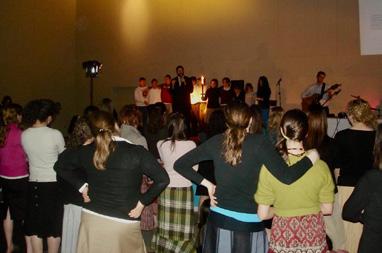

These memories come back to me this week as our family, b’ezrat Hashem, celebrates the bar mitzvah of our youngest son, Mordechai. He will be reading Parshat Ki Teitzei, the parsha with the most mitzvot in the entire Torah. My prayer to Hashem is that the love He shows us through the gift of His mitzvot will continue to be reflected in all of our children. I look forward to standing beside Mordechai Tzemach as he reads all 74 mitzvot in this week’s parsha, and to reflecting on the eternal goals Hashem has set for us.
Let us pray that the passion our youth show when singing and dancing—whether they fully understand the words or not—will carry over into all aspects of their lives. May that same passion inspire them in their davening, in their acts of chesed, in their service in the army, and in their commitment to defend and uplift the Jewish people. Thank
God, we can already see a generation filled with passion, filled with light, and filled with greatness. May that passion bring us, b’ezrat Hashem, to Mashiach Tzidkeinu.
Wishing you all an uplifting and inspiring Shabbat, Rabbi Avi Berman

Executive Director, OU Israel

Mazal Tov to Richard & Brondie Levine and family on the Bar Mitzvah of their grandson

New-4 room apartment, large terrace + garden, magnificent unobstructed panoramic views, fully accessible, covered parking, Mamad, near mall, sports centers & technological park, the Zoo & Aquarium, Exclusive! Dotan 053-5888824
2.5 room apartment, authentic building, arched windows, easy access from parking, no steps, convenient & efficient design, near green parks, synagogues, the Cinematheque, the Khan Theatre, The Old City, The 1st Station & Mamilla shopping & entertainment centers, major luxury hotels & more. Exclusive! Galila 053-6642512

Large sukkah balcony + huge private roof terrace, spectacular views, high-end finishes, spacious Mamad, 2 covered parking spots, direct elevator to apartment, near schools, parks, synagogues, nature, Malcha Mall, Hadassah Hospital, Exclusive! Galit 053-7626217
Beautiful, rare Arab-style 6-room “stand alone” house, 217 Sq.m. on a large plot, 500 Sq.m beautiful surrounding garden, original floors, high ceilings, quiet pastoral location, minutes walk from Emek Refaim shops and restaurants, Orient hotel, First Station and more. Exclusive! Galila 053-6642512
3 Moshe Hess St. Jerusalem 0778038511








kerenmalki.org 02-567-0602 Keren

marci@bezeqint.net

















OU EXECUTIVE VICE PRESIDENT
Memory is identity. This was expressed beautifully by Rabbi Sacks z”l in his Haggadah commentary:
“There is a profound difference between history and memory. History is his story – an event that happened sometime else to someone else. Memory is my story – something that happened to me and is part of who I am. History is information. Memory, by contrast, is part of identity. I can study the history of other peoples, cultures, and civilizations. They deepen my knowledge and broaden my horizons. But they do not make a claim on me. They are the past as part. Memory
May the Torah learned in this issue be in the merit and memory of our dear Mother, Grandmother and Great Grandmother, an Auschiwitz survivor:
Rebbetzin Devorah
Hilsenrath a”h
Chaya & Azriel Heuman
Baruch & Sima Hilsenrath
Rochelle & Phil Goldschmiedt
Aviva & Michael Rappaport
is the past as present, as it lives on in me. Without memory there can be no identity.”
The Rebbe of Slonim, author of Nesivos Shalom, similarly wrote (Kuntres Haharuga Al’echa)
“The essence of a Jew is not transient, limited to the time he spends on this earth, rather the Jew’s existence is eternal, embracing the past, the present, and the future… The connection we forge to the eternity inherent in our Jewish soul and to the world of Klal Yisrael is accomplished through the Zechirot, the core elements that comprise our national memory. When a Jew remembers Sinai, the Exodus, or the perpetual threat personified by Amalek, etc., this binds him to both his own eternal soul and to the world of Klal Yisrael, and the more we connect to that eternity the more we are nourished by it.”
Of the six critical elements of memory mandated by the Torah, the Sheish Zechirot, Parshat Ki Teitzei contains two, Amalek (25:17) and Miriam (24:9). Remembering the perpetual threat of Amalek is sadly core to our Jewish identity and perspective as we can never afford complacency relative to the ongoing threats to our body and spirit that are our harsh reality in each and every
generation, b’chol dor vador . But why is the same true of the memory of Miriam’s leprosy that resulted from her speaking critically of Moshe? While we have come to understand the terrible damage caused by harmful speech and recognize the Mitzvah value of Shemirat Halashon (guarded speech), in what way does this memory and vigilance constitute a critical part of our identity?
Magen Avraham (OC 60:1) cites a fascinating passage from the Kabbalistic teachings (Shaar Hakavanot) of Rav Yitzchak Luria, the Arizal, where he suggests that we should explicitly recall each of those

All the following are directly opposite beach and Marina… close to Synagogues and shopping and will go fast!
3 rooms, 2 bathrooms + machsan and parking – 1.5 mil NIS
Last 5 room high floor available in Dimri project …call
4 new penthouses for sale with/ without swimming pool …
Fabulous 5 room open plan, amazing view with pool and gym


A s h k e l n









and our next step will be to plant a fruit tree. I never thought of myself as being the agricultural type, but the feeling of settling and planting a portion of Eretz Yisrael, has been truly euphoric. Iy”H, when we plant our tree, and eat the fruits that will grow one day, I think we will be able to truly appreciate that unique Kedusha found in the fruit of Eretz Yisrael!
TRANSFORM YOUR WALLS AND CEILINGS.
Flawless finishes that add elegance to any space. Wall & Ceiling repairsSmoothing, Straightening, and perfecting every surface.
Spackling & Prep
Work- Because the foundation matters.

To conclude, when you buy your Tu B'shvat fruit this year, don’t search for those dried apricots and banana chips imported from Turkey. Rather, head over to the fresh produce and buy yourself some nice juicy Kedusha-filled Jaffa oranges and thank Hashem for bringing you to this land in order to be able to הבוטמ
DAVID KUSHNER
, imbibing that Kedusha in every bite that you take!!
We can rescue any wall or ceiling. 058-661-0728



BY RABBI CHANOCH YERES RAV, BEIT KNESSET BEIT YISRAEL, YEMIN MOSHE
"Remember what Amalek did to you" (25:17)
"You shall blot out the remembrance from under heaven, you shall not forget." (25:19) Why the need for the repetition, "remember" and then "shall not forget"? Is there a difference between remembering and not forgetting?
Ramban (Rabbi Moshe ben Nachman 1194-1270) explains, quoting the Sifra, that "not forgetting" refers to one's heart while "remember" is by verbal utterance. This is why we read in public this section on Shabbat Zachor, hinting at the need to hear Megillat Eshter being read. We must not forget in our hearts what Amalek did to us until we eradicate his remembrance from under the heavens. This is a message for the generations. Similarly, the same phrase "remember' is used in the story of Miriam's slander of Moshe (24:9). One might have thought it would be better to downplay this incident and mention it less. However, the Torah instructs us to discuss this slander in public and reveals that the warning of speaking slander is "placed in their mouths"(31:19). This is to clarify to all the seriousness of speaking slander and to avoid it. Shabbat Shalom

ALIYA-BY-ALIYA
Aliya-by-Aliya Sedra Summary
Rabbi Reuven Tradburks
RABBI REUVEN TRADBURKS
RCA Israel Region
RCA ISRAEL REGION
In memory of Evelyn Rivers a”h
Mother of Reuven Tradburks
The parsha contains 74 mitzvot, the most of any parsha in our Torah. It is the last of the 3 parshiot of mitzvot that are the middle section of Sefer Devarim.
In Parshiot Re’eh and Shoftim we were introduced to our Jewish National society; an ethical monotheistic society. Laws of avoiding idol worship, the centrality of what would be Jerusalem, laws of generosity, of sharing with others. And of Nation building; Judges, Kings and war.
Our parsha is personal, not national. A Jew is not only a part of a nation. He is a person living the day-to-day life of people; living a life of holiness, fidelity to G-d, treating people with generosity and dignity, helping each
We will mark the 9th yahrzeit of our dear husband, father, grandfather and great-grandfather
on Sunday afternoon Sep. 14 -
We will meet in the main parking lot of Har Hamenuchot at 5:45pm Litke, Sorotzkin and Gruner Families
other, living a moral life.
Ki Teitzei is a sister parsha to Kedoshim. Many of the marvelous, unique moral imperatives of our Torah, those principles that became foundational in the moral development of the world are found here. Perhaps to communicate that while we are part of a great nation and ought to give altruistically to nation building, our national pride and place ought not to muscle out the need to be good people, overwhelming our personal lives in the large project of our Jewish Nation. No. We at heart live personal holy lives, believing in One G-d and believing in the Image of G-d of each person. Living elevated and noble lives. The 74 mitzvot of our parsha communicate that rarefied life.
1ST ALIYA (DEVARIM 21:10-21)
Captive Woman: One may not marry a woman captured in war until 30 days have elapsed and the passion subsided. First born : The rights of the first born to a double portion shall not be diverted to the first born of a more favored wife. Ben Sorer Umoreh: a boy entering adulthood who is brazen and gluttonous shall be judged on the fear of future more egregious behaviour.
The soldier is able to marry the non-Jewish woman captured in war; but only after a month of seeing her daily in an unkempt manner. As if to say – slowww downnn. This slowed down permission to marry the non-Jewish woman in war has a powerful implied ethic: women are not spoils of war.
As we know all too well, oh so tragically and painfully, war is accompanied by rape and pillage of women. It is an expression of power, of victory. Women are the spoils of war.
Not in the Jewish army. The permission granted to marry this non-Jewish woman after a month screams out the far more basic war ethic: war should never ever be seen by the Jewish army as license for abuse of women.
But this first mitzvah of the parsha seems to belong in last week’s parsha. At the end of Shoftim there were a number of mitzvot related to war: the special Kohen who motivates the troops in war, the war exemptions, try peace first, do not destroy fruit trees in war. Would it not have made more sense to include this mitzvah of the special procedure of marrying a foreign woman in war in last week’s parsha that was speaking of war?
Last week’s parsha was national institutions. This week’s parsha is personal piety. This mitzvah is an expression of personal piety, piety demanded even of the soldier. It belongs in our parsha of piety.
2ND ALIYA (21:22-22:7)
Burial: Do not allow the body of one sentenced to death to be hung. He is to be buried immediately. Returning Lost Property: Don’t look away from lost property; return it to its owner. Help up an overly burdened animal who has buckled; don’t look away. Do not cross dress. Send a mother bird away before taking the eggs or chicks.
There is an important ethical principle expressed in the mitzvah of burying the one put to death. A person sentenced to death has committed the most serious of
sins. Nonetheless, human beings never lose the right to dignity. Even the sinner, the one sentenced to death, is a human being; their body is not to be left hanging, but to be buried immediately. Human beings may sully their dignity by terrible crimes deserving of death; but they never forfeit their essential human dignity.
A further implied ethic is contained in the return of lost property. Laws of property, Torts, are to protect: property law regulates that I not damage your property. But Jewish ethics mandates that we go much further; I need to jump to help your property. There can be no innocent bystanders; we need to jump to save the lives of others and the property of others.
3RD ALIYA (22:8-23:7)
Build a fence on your roof to prevent accidents. Do not: plant vines and grain together, plow with ox and mules together, wear wool and linen together. A man shall not: slander a new bride claiming her not to be a virgin, nor commit adultery with a married woman, nor with a betrothed bride, nor rape a single woman. One may not marry a mamzer, nor
Dedicated in loving memory of our dear Mother and Grandmother
Helen (Honey) Newman a”h On her 25th Yahrzeit -
Judith Berger, Zale Newman, Chaviva Braun and families
a male from Amon or Moav.
In this aliya we have mitzvot about the most basic of daily life: our homes, our fields or livelihood, our clothes and our relationships with our partners. Each one of these regulates the basic aspects of our lives.
In this lies a sweeping principle of our Torah. We live mundane lives. Homes, livelihood, clothes, and relationships. All these things take on meaning when regulated by mitzvot. The Torah doesn’t deal only with the holy, with G-d, with prayer and service. It gets right into our lives, pushes its way into our homes, kitchens, bedrooms.
Rav Soloveitchik called this redemption, or geula; man’s mundane life is redeemed from vulgarity and emptiness by mitzvot. Suddenly, the trite and trivial, the banal life we live becomes meaningful, an expression of loyalty to our Creator and His love of us by commanding us. Nary a moment is devoid of some mitzvah or other, transforming our lives into lush, full and meaningful moments. A redeemed existence.
4TH ALIYA (23:8-23:24)
One may marry one from Edom or Egypt. Military encampments shall be treated with a degree of cleanliness; bathroom facilities shall be outside the camp. Since G-d’s presence goes with you, your camp has holiness. Shelter a runaway slave. Do not engage in prostitution, nor accept its gains as offerings. Do not exact loan interest. Do that which you vow; do not delay its fulfilment.
The charging of interest on a loan is not permitted. This is a Torah legislated type of welfare. When a person is in trouble and needs a loan, he is vulnerable to loan sharking. If he needs money and is desperate,
what better recipe for milking him for all he is worth. The Torah forbids preying on misfortune. Find another way to profit; not on the backs of the misfortunate.
5TH ALIYA (23:25-24:4)
Harvesters may eat grapes or grains while harvesting. Divorce: Divorce need be done through a bill of divorce (a Get). If the woman marries another man, she may subsequently not return to remarry the first husband.
Allowing the worker to eat that which he is harvesting is the introduction of employer ethics. Being an employer comes with responsibility; people’s lives are in our hands. Allowing the worker to consume what he is harvesting is merely an example of sensitivity to the feelings of employees. Worker’s rights have their basis in these verses.
Divorce is accomplished through a Get, or a document of divorce. While the creation of a marriage is called kiddushin and has holiness, this holy union may be dissolved through divorce. While we view marriage as holy, it is holiness in the difficult realm of human interactions, which sometimes sour. The Torah’s permission to dissolve a marriage is an expression of the recognition of the complexity of life. While marriage is holy, allegiance to the marriage does not require one to live a life of misery.
6TH ALIYA (24:5-13)
First year marriage: Do not go to war in the first year of marriage: bring joy to the new bride. Kidnapping is a capital offense. Remember Miriam’s Tzaraat and keep its laws. Collateral may be taken, but only with the owner’s cooperation. If the owner needs this collateral, return it to him nightly.
Kidnapping, the taking of hostages, is a capital offense punishable by the death penalty. Knowing how we so value life, we become vulnerable to evil, cynical, and perverse manipulation; the kidnapping of innocent people, demanding ransom or who knows what. The Torah’s view is expressed in the punishment; this is a capital offense. Amongst the worst of ethical violations.
Do not withhold wages: workers are to be paid before the end of the day. Do not pervert justice of the foreigner or widow. When harvesting grain, olives or grapes, leave the dropped produce for the needy. No more than 40 lashes shall ever be given. Yibum: a brother shall marry the childless widow of his brother and hence maintain his name. Maintain only accurate weights and measures. Remember what Amalek did to you in attacking the weak when you left Egypt. Erase any memory of him.
In one aliya we have mitzvot of wages, of justice, of kindness, of lashes, of levirate marriage, of honesty in business and of Amalek. The lack of a clear pattern to these mitzvot is itself instructive. Perhaps Moshe is deliberately moving from generosity to justice to business to war. He wants to cover mitzvot in all aspects of our life. Our lives include homes and relationships and work and war and honesty and justice and paying our workers….and on and on. In all aspects of our lives we have mitzvot; ways to do things nobly and with holiness.
It is this richness of behavior in our personal life that is truly the necessary ingredient of nation building. The Jewish nation will be built on ethical monotheism, on national institutions that are kept in check; but ultimately a great nation is built in the homes
and in the private lives of its citizens. Our great nation is built on the quiet greatness of its people.
This week's haftorah is the fifth of a series of seven "Haftarot of Consolation." The navi, Yeshayahu, compares the city of Jerusalem to a barren woman devoid of children. Hashem enjoins her to rejoice, for the time will arrive when the Jewish nation will return and repopulate the Holy City. The prophet promises the Jewish people that Hashem has not forsaken them. Although at times Hashem hides His countenance He will certainly gather them from the galut with great mercy.
“For like the waters of Noach shall this be for Me: As I have sworn never again to pass the waters of Noach over the earth, so have I sworn not to be wrathful with you or rebuke you.”
49th of the 54 sedras; 6th of 11 in Devarim. Written on 212.8 lines; ranks 21st. 44 Parshiyot; 2 open, 42 closed; rank: 1. 110 pesukim; ranks 28th (5th in Devarim). 1582 words; ranks 23rd (5th in Devarim). 5856 letters; ranks 26th (6th in Devarim).
74 mitzvot - 27 positive, 47 prohibitions; Ki Teitzei has the most mitzvot (both positive and prohibitions) in the Torah.

BY RABBI NACHMAN (NEIL) WINKLER FACULTY, OU ISRAEL CENTER
“Roni akara”-“Sing out, O barren one,” “pitzchi v’tzahali”-“burst forth in song and be jubilant”! These clarion calls to Israel with which the navi Yishayahu opens our haftarah this week, are truly, unique cries. Consider:
Throughout these post-Tish’a B’av haftarot of consolation, we have read a number of the prophet’s visions that describe a glorious future for the grieving nation. We listened to the chants and the praises toward our powerful G-d Who could, and would, bring about the promised miracles of victories over Israel’s powerful enemies. And we have also heard soothing words of solace urging the people to allow Yishayahu’s prophecies to comfort them, as G-d reassures them that their punishment and suffering would soon be removed. However, never before had we heard such a call for the nation to rejoice over the news, In last week’s haftarah (chapter 52) we read of the prophet’s call for the Holy City to rise from the ashes of her destruction and to the ruins of Jerusalem to rejoice - but there was no such call for the people to do the same.

Over the past weeks, we have heard the navi’s predictions of a miraculous rebirth of the produce in the Land of Israel that would consequently lead to great joy and gladness there (chapter 51, haftarah of Ekev).
But never before had we heard the prophet’s call for the nation herself to rejoice.
In attempting to understand why this haftarah begins with a declaration that Israel rejoice, perhaps we should begin by recalling that Chazal see these seven haftarot of consolation as steps toward return; the nevuot therein include sequential steps of increasing comfort, and these steps, would ultimately, lead us closer to HaKadosh Baruch Hu inspiring us to repair our relationship with G-d and, thereby, preparing Israel to stand before Him on the Yamim Nora’im. This successful “journey through the haftarot” is meant to help an oft- suffering generation move closer to her Creator and open the doors to teshuva and to Hashem’s atonement.
But what did our Rabbis see in this haftarah specifically that had them regard her words as reflecting a higher level of consolation than the earlier prophetic messages? Or, simply: What inspired Yishayahu himself, for the first time, to cry out to the nation “Roni”, “Rejoice!”.
The answer might be found in the latter part of this chapter 54, (a section is read for the haftarah of parashat R’ei), in which G-d proclaims His everlasting love for ALL of Israel, both the righteous and the not-yet-righteous. Indeed, the verses that immediately
follow the closing of the haftarah of parashat Re’i, contain the haftarah for a fast day, “Dirshu Hashem b’himtz’o” which calls for Israel to seek out Hashem and abandon their wayward ways. Is it any wonder, then, that Chazal tell us that “bhimatz’o” - the time when G-d is especially close to us and can be reached more readily – is actually right now, the days of Elul and the Yamim Nora’im!
These days are not simply days of comfort and regret-they are days of rejoicing as well, “Roni”. For the knowledge that G-d loves ALL of Israel and has granted us a special time to call out to Him and be comforted, forgiven…. and, of course, to rejoice!
Rabbi Winkler’s popular Jewish History lectures can be viewed by visiting the OU Israel Video archive: https://www.ouisrael.org/video-l ibrary
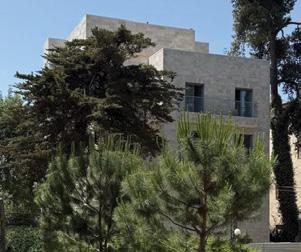





Join us for an evening of film and life-saving conv ersation featuring the award-winning short film “Levi” and a n insightful panel discussion on suicide prevention.




be in loving memory and
our dear parents whose yahrtzeits are in Kislev
been memorialized in a popular song, "An eternal people does not fear the
and arduous path."
Doris Weinberger a"h
Max Weinberger z”l
Patience is necessary for those who fol low Isaac's way. But a wise woman taught us that patience is but another name for hope. That woman was Jane Austen, who put these words into the mouth of one of the characters in her great novel, Sensibility: "Know your own happiness. You want nothing but patience—or give it a more fascinating name: call it hope."
Greatly missed by their children, grandchildren and great grandchildren
Rav Aryeh and Dvora Weinberger
Bernie and Leah Weinberger Menachem and Hannah Katten
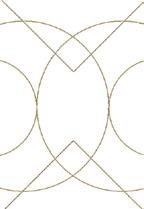

In observance of the Shloshim of our friend Yehuda Leib Berren z"l
Rav Menachem Weinberg will give a shiur in his memory "Heroic Joy" Monday evening, 23 November/ 8






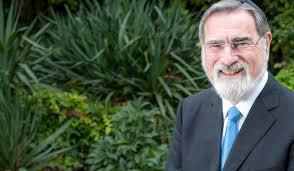
Covenant & Conversation
THOUGHTS ON THE WEEKLY PARSHA
Thoughts on the Weekly Parsha
RABBI LORD JONATHAN SACKS ZT"L
RABBI LORD JONATHAN SACKS ZT"L
FORMER CHIEF RABBI OF THE UNITED HEBREW CONGREGATIONS OF THE COMMONWEALTH
FORMER CHIEF RABBI OF THE UNITED HEBREW CONGREGATIONS OF THE COMMONWEALTH
May the learning of these Divrei Torah be
HaRav Ya'akov Zvi ben David Arieh zt"l
Darkness cannot drive out darkness: only light can do that. Hate cannot drive out hate: only love can do that. Hate multiplies hate, violence multiplies violence, and toughness multiplies toughness . . . (Martin Luther King)
I imagine one of the reasons people cling to their hates so stubbornly is because they sense, once hate is gone, they will be forced to deal with pain. (James Arthur Baldwin)
There is a verse in Ki Teitse that is momentous in its implications. It is easy to miss, appearing as it does in the midst of a series of miscellaneous laws about inheritance, rebellious sons, overladen oxen, marriage
Private Health Coverage for Critical Conditions

NOT Covered by Kupat Cholim
Don't wait until it's too late. Your age is your advantage – use it today.
Norman Zysblat 054-4258671 Licensed Insurance Professional
violations and escaping slaves. Without any special emphasis or preamble, Moses delivers a command so counterintuitive that we must read it twice to make sure we have heard it correctly:
Do not hate an Edomite, because he is your brother. Do not hate an Egyptian, because you were a stranger in his land. (Deut. 23:8)
What does this mean in its biblical context?
The Egyptians of Moses’ day had enslaved the Israelites, “embittered their lives”, subjected them to a ruthless regime of hard labour and forced them to eat the bread of affliction. They had embarked on a programme of attempted genocide, Pharaoh commanding his people to throw “every male [Israelite] child born, into the river” (Ex. 1:22).
Now, forty years later, Moses speaks as if none of this had happened, as if the Israelites owed the Egyptians a debt of gratitude for their hospitality. Yet he and the people were where they were only because they were escaping from Egyptian persecution. Nor did he want the people to forget it. To the contrary, he told them to recite the story of the Exodus every year, as we still do on Passover, re-enacting it with bitter herbs and unleavened bread so that the memory would be passed on to all future generations. If you
want to preserve freedom, he implies, never forget what it feels like to lose it. Yet here, on the banks of the Jordan, addressing the next generation, he tells the people, “Do not hate an Egyptian”. What is going on in this verse?
To be free, you have to let go of hate. That is what Moses is saying. If they continued to hate their erstwhile enemies, Moses would have taken the Israelites out of Egypt, but he would not have taken Egypt out of the Israelites. Mentally, they would still be there, slaves to the past. They would still be in chains, not of metal but of the mind – and chains of the mind are the most constricting of all.
You cannot create a free society on the basis of hate. Resentment, rage, humiliation, a sense of injustice, the desire to restore honour by inflicting injury on your former persecutors – these are conditions of a profound lack of freedom. You must live with the past, implies Moses, but not in the past. Those who are held captive by anger against their former persecutors are captive still. Those who let their enemies define who they are, have not yet achieved liberty.
The Mosaic books refer time and again to the Exodus and the imperative of memory: “you shall remember that you were slaves in Egypt”. Yet never is this invoked as a reason for hatred, retaliation or revenge. It always appears as part of the logic of the just and compassionate society the Israelites are commanded to create: the alternative order, the antithesis of Egypt. The implicit message is: Limit slavery, at least as far as your own people is concerned. Don’t subject them to hard labour. Give them rest and freedom every seventh day. Release them every seventh year. Recognise them as like you, not ontologically inferior. No one is born to be


Jerusalem Real Estate is My Business Eta: 054-723-3863
Amazing stand alone homes in OLD KATAMON, TALBIYA, BAKA, GERMAN COLONY
OLD KATAMON.
145 sqm of living space plus additional 45 sqm finished attic that can be more bedrooms. In addition, a 30 sqm sukka terrace off main floor, private elevator, storage and parking.
Price 10,200,000 NIS
Exclusive BAKA. Fantastic, charming apartment. 100 sqm with Shabbat elevator, sukka terrace, registered parking and storage. 113 sqm attic. High ceilings and very light!!!!
MUST SELL: 5,500,000 NIS
New project SAN SIMON
140 sqm on one floor, Shabbat elevator parking, storage.
Built as 3 bedrooms and 2.5 bathrooms. Perfect condition.
Price 7,500,000 NIS
ABU TOR RENTAL APT.
150 sqm on 2 floors, historic apartment, 3 bedrooms, 2 full bathrooms, garden. Price 13,000 NIS/month
ARNONA 180 sqm
Penthouse on an exclusive street. Fabulous views. 40 sqm balcony. Registered parking. Very high standard finish. Price: 9,200,000 NIS








Eta Morris Realty, Ltd. etamorrisrealestate@gmail.com Eta: 054-723-3863 etamorrisrealty.co.il
a slave.
Give generously to the poor. Let them eat from the leftovers of the harvest. Leave them a corner of the field. Share your blessings with others. Don’t deprive people of their livelihood. The entire structure of biblical law is rooted in the experience of slavery in Egypt, as if to say: you know in your heart what it feels like to be the victim of persecution, therefore do not persecute others.
Biblical ethics is based on repeated acts of role-reversal, using memory as a moral force. In the books of Shemot and Devarim, we are commanded to use memory not to preserve hate but to conquer it by recalling what it feels like to be its victim. “Remember” – not to live in the past but to prevent a repetition of the past.
Only thus can we understand an otherwise inexplicable detail in the Exodus story itself. In Moses’ first encounter with God at the Burning Bush, he is charged with the mission of bringing the people out to freedom. God adds a strange rider:
I will make the Egyptians favourably disposed toward this people, so that when you leave you will not go empty-handed. Every woman is to ask her neighbour and any woman living in her house for articles of silver and gold and for clothing, which

you will put on your sons and daughters. (Ex. 3:21-22)
The point is twice repeated in later chapters (Ex. 11:2, Ex. 12:35). Yet it runs utterly against the grain of biblical narrative. From Genesis (14:23) to the book of Esther (9:10, 9:15, 9:16) taking booty, spoil, plunder from enemies is frowned on. In the case of idolaters, it is strictly forbidden: their property is cherem, taboo, to be destroyed, not possessed (Deut. 7:25; 13:16).
When, in the days of Joshua, Achan took spoil from the ruins of Jericho, the whole nation was punished. Besides which, what happened to the gold? The Israelites eventually used it to make the Golden Calf. Why then was it important – commanded – that on this one occasion the Israelites should ask for gifts from the Egyptians? The Torah itself provides the answer in a later law of Deuteronomy about the release of slaves:
If a fellow Hebrew, a man or a woman, sells himself to you and serves you six years, in the seventh year you must let him go free. When you release him, do not send him away empty-handed. Supply him liberally from your flock, your threshing floor and your winepress. Give to him as the Lord your God has blessed you. Remember that you were slaves in Egypt and the Lord your God redeemed you. That is why I give you this command today. (Deut. 15:12-15)


Slavery needs “narrative closure”. To acquire freedom, a slave must be able to leave behind feelings of antagonism to his former master. He must not depart laden with a sense of grievance or anger, humiliation or slight. Were he to do so, he would have been released but not liberated. Physically free, mentally he would still be a slave. The insistence on parting gifts represents the Bible’s
psychological insight into the lingering injury of servitude. There must be an act of generosity on the part of the master if the slave is to leave without ill-will. Slavery leaves a scar on the soul that must be healed.
When God told Moses to tell the Israelites to take parting gifts from the Egyptians, it is as if He were saying: Yes, the Egyptians enslaved you, but that is about to become the past. Precisely because I want you to remember the past, it is essential that you do so without hate or desire for revenge. What you are to recall is the pain of being a slave, not the anger you feel towards your slave-masters. There must be an act of symbolic closure. This cannot be justice in the fullest sense of the word: such justice is a chimera, and the desire for it insatiable and self-destructive. There is no way of restoring the dead to life, or of recovering the lost years of liberty denied. But neither can a people deny the past, deleting it from the database of memory. If they try to do so it will eventually come back – Freud’s “return of the repressed” – and claim a terrible price in the form of high-minded, altruistic vengeance. Therefore the former slave-owner must give the former slave a gift, acknowledging him as a free human being who has contributed, albeit without choice, to his welfare. This is not a squaring of accounts. It is, rather, a minimal form of restitution, of what today is called “restorative justice”.
Hatred and liberty cannot coexist. A free people does not hate its former enemies; if it does, it is not yet ready for freedom. To create a non-persecuting society out of people who have been persecuted, you have to break the chains of the past; rob memory of its sting; sublimate pain into constructive energy and the determination to build a different future.
Freedom involves the abandonment of hate, because hate is the abdication of freedom. It is the projection of our conflicts onto an external force whom we can then blame, but only at the cost of denying responsibility. That was Moses’ message to those who were about to enter the Promised Land: that a free society can be built only by people who accept the responsibility of freedom, subjects who refuse to see themselves as objects, people who define themselves by love of God, not hatred of the other. “Do not hate an Egyptian, because you were strangers in his land,” said Moses, meaning: To be free, you have to let go of hate.
These weekly teachings from Rabbi Sacks zt”l are part of his ‘Covenant & Conversation’ series on the weekly Torah teaching. With thanks to the Schimmel Family for their generous sponsorship, dedicated in loving memory of Harry (Chaim) Schimmel. Visit www.RabbiSacks.org for more.

Dr. Aviva Stanislawski is inviting you to a

MUSICAL SOUL FOOD FOR THE JEWISH NEW YEAR: Zoom lecture in English--free of charge
A multi-media presentation of the inspiring music of the High Holidays
SUNDAY SEPTEMBER 7, 2025
AT 19:00 ISRAEL TIME Prior Registration is required



Brand new building on Mekor Chaim
Recently finished, 4 rooms, 111m, mirpeset, storage, parking, Shabbat elevator, 3rd floor. 4.37m nis
Great opportunity to buy in a new building under construction in Arnona/ Talpiot
2-5 rooms, great payment terms and prices start at just 2.19m nis
For rent in Bustan Baka
Over sized 3 room including a safe room, 95m + 9m mirpeset, 3rd floor with Shabbat elevator, parking space, furnished, green views. 13,200nis/month




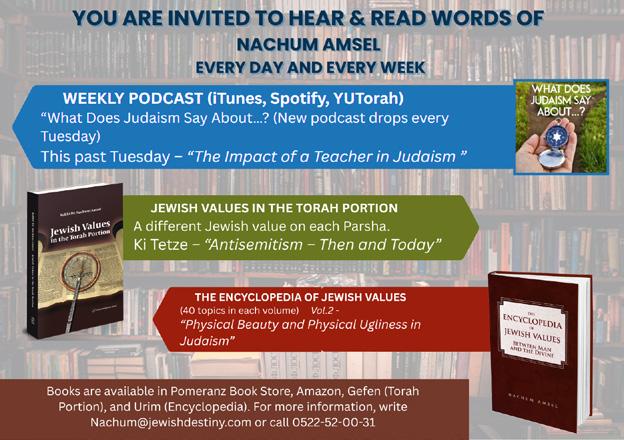


Rabbi Shalom
In Memory of my dear brother Moshe z”l on his 9th yahrzeit.
I carry you in my heart and miss you every day
- Chava Kadoche
The Torah dictates in no less than four distinct locations, using the same exact phrase, that we are to recall that we were slaves in Egypt. Two of these pesukim appear in this week’s parsha. Why is it so important to repeat this statement and is there any connection between the different iterations?
In Parshat Ki Teitzei (Devarim 24:17-18) with respect to the manner in which to behave to a
In Loving Memory of Rabbi Pinchas Shebson
on his 40th yahrzeit 14th Elul - Sunday 7th September
Missed every day by his children, grandchildren and great-grandchildren together with his wider family and his many friends whose lives he touched
widow and orphan the Torah states:
Later in the Parsha (Devarim 24: 21-22), with respect to charity to be given to widows and orphans the Torah states:
In Parshat Ve’etchanan (Devarim 5: 14-15) in connection with Shabbat the Torah dictates:
Lastly, in Parshat Re’eh (Devarim 15-14-15), in connection with setting a servant free, we are instructed not to let him go empty-handed (
):
Rabbi Schwab (Maayan Bet Hashoeva) offers an insightful explanation as to the connection between these four statements. When we recall what transpired in Egypt, the intention is not just to remember the bitterness and back-breaking labor that we experienced. The midrashim shed light on the fact that we never gave up hope. Women would encourage their husbands to continue to procreate irrespective of Pharaohs decree to throw all male babies into the Nile. We were able to get one day off - on Shabbat (Shemot Raba 1:24) pursuant to Moshe’s request. When we recall the enslavement in Egypt, we are also to recall
the positive attitude that many had and the ability to accept the challenges with love and faith )הבהאמ םירוסי).
The four pesukim highlighted above deal with widows and orphans, a newly freed servant and Shabbat. It is specifically in these areas that we need to offer our encouragement. Having experienced poverty and helplessness in Mitzrayim, we ought to reach out to those in need. Just as we had faith that Hashem would redeem us in Mitzrayim, so too we must assist and strengthen the underprivileged. They too should enjoy some rest and peacefulness, as we experienced on Shabbat in Mitzrayim.
Perhaps that is why when we eat the marror at the Seder we mix it with the haroset. To recall that all was not strictly bitter in Egypt- but rather it was bittersweet! Through faith and belief in Hashem, we were able to persevere, lift ourselves up and merit the redemption. When we recall our experience in Egypt we should recollect not just the enslavement, but the faith and courage that facilitated survival.
As we experience challenges on a personal and national level, may we be able to recognize the hand of God in the many miracles that we are witnessing, strengthen our emunah and bitachon and merit a geula shelema bemihera b’yamenu!


• Due to popular demand, we are starting an Ashkelon Garin for anyone in their 20s, 30s and 40s.
• Ashkelon has affordable housing, wide choice of schools, accessible by train, bus and highways and some of the best parks and beaches in Israel!



Faculty, OU Israel Center
“An Ammonite or Moabite shall not enter the assembly of Hashem; even the tenth generation shall never enter the assembly of Hashem.” (Devarim 23:4)
The Torah forbids members of these nations from marrying into the Jewish people, as they did not greet the Jews with water and bread when they left Egypt and moreover, they hired Bilam to curse the Jewish people. What is puzzling here is that the Torah was given in its entirety at Har Sinai, yet these particular events had not even occurred!
The Beis Halevi offers a fundamental approach to the way we relate Torah and mitzvot. Truth be told, all mitzvot are Divine in origin and are beyond our mortal comprehension. As Hashem’s chosen nation, we are obligated to fulfill His Will for no other reason than that He commanded it. Thus, we are forbidden to include Amonites and Moavites irrespective of the reason. However, the Torah does record a reason so as to emphasize the negative qualities these nations exhibited. In doing so, we are cautioned to act differently, adhering to the values and morals set out by Torah law and spirit. In effect, Hashem caused the Amonites and Moavites to behave this way, so we have
a clear definition between us. Living Torah positively impacts our nature and forms our identity.
Rav Lopian zt”l in Lev Eliyahu expounds on this idea. Hashem created the world for the sake of Torah, and not the opposite. We are not warned against theft because people tend to steal. Rather, since Hashem wanted to give us the opportunity to learn Torah and keep His mitzvos, He created within us a desire to steal.
When viewing the Torah and indeed, the entire world in this light, we are led to reassess our conventional paradigms. At the beginning of the parashah, Rav Gedalya Schorr zt”l notes in Ohr Gedalyahu, that wherever we go we encounter opportunities to do mitzvot. Often, we look at mitzvot as something that we happen to do, or something we need to do to get on with our day. Instead, we must try to view mitzvot as the essence of our lives. The Zohar Hakadosh defines mitzvot as 613 mediums through which we can connect with Hashem. Although we do ascribe reasons for mitzvot to make them more understandable and relatable, we cannot forget that it is the mitzvah itself that we are after.
When we understand this dynamic, we will search out opportunities to do mitzvot, as they are the purpose and intention of creation. Connecting with the Will of Hashem and accessing the core of creation is the greatest reason to do a mitzvah.
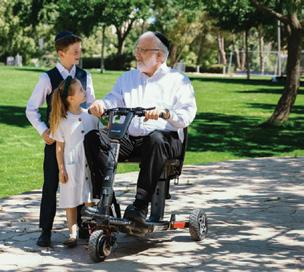

SHABBATTO scooter offers a "Mehudar" Zomet-approved Shabbat mechanism that operates according to the "Existing Current Modulation" principle. The Shabbat mechanism is pre-installed and does not require expensive fitting.


Ready to go in 10 seconds. Folds and splits into 2 lightweight parts
For a FREE DEMO Call 077-9562833
For more information, visit our website at: movinglife.co.il/torah24
Saturday Night September 13th 2025 10:00 PM


Executive Director, Camp HASC
Author of Baderech: Along the Path of Teshuva (Mosaica 2021)
Mischel EXECUTIVE DIRECTOR, CAMP HASC AUTHOR OF BADERECH SERIES
Beloved Israeli author, Shmuel Yosef “Shai”
Agnon wrote extensively on themes and topics revolving around his Jewish identity, relationship to Torah and love for Yiddishkeit. His subjects and work capture the authentic, heimish nuances of the European shtetl culture, while dealing with the tension between traditional Jewish life and values in the modern world. Ultimately, these gifts earned him the Nobel Prize for literature.
Penned in 1941 from his home in Talpiot, Yerushalayim, בהואל ביואמ, From Foe to Friend, is a short story that explores the human struggle to tame nature and establish a home in the Land of Israel, specifically in the Holy City. The story follows a narrator's attempts to build a house on a hill despite the destructive force of the wind, which is personified as a powerful enemy. Through this allegory, Agnon examines themes of
Do you have a life insurance policy you:
• No longer want?
• No longer need?
• Can no longer afford the premium?
• Could you use extra money instead of keeping your policy?
I can guarantee that if you qualify with the underwriting process I can get you more money than if you cash it in with the company.
Please contact Moshe Russell at: Buymypolicy32@gmail.com
resilience, the relationship between humanity and nature, and the challenges of settling in a new land while yearning for rootedness, permanence, and a basic sense of security.
The powerful winds that once dominated the open areas around Jerusalem are portrayed as a "king" and his "ministers", constantly blowing down anything in their path. Despite the wind's destructive power, the narrator is determined to build a house on a hill. He attempts all sorts of different methods that fail to withstand the wind's force, until he finally adapts by building a more resilient structure that respects the wind’s strength rather than trying to defeat it. It brings a sense of peace and shleimus when he accepts the challenges and reality of his struggle.
This tale is an allegory of the eternal longing of the Jewish people to dwell securely in our homeland. As the protagonist struggles to tame the wind so that he can build his home, the Jewish People continuously struggle to overcome adversity and adversaries, and root themselves in their true home.
“When you go out to war against your enemies...” (Devarim 21:10)
The harshness of the Land of Israel — its dryness, thorns, and resistance — appears at first as an enemy to the pioneer. But over time, the protagonist sees that the Land was never the enemy. The real battle was actually with internal reactions to his own mindset, his lack of patience and his inherited fears of exile. The enemy, it turns out, was how he
viewed the Land. Through this awakening, the imaginary “foe” becomes a friend, and peace and wholeness descend.
This process reflects a powerful teaching of the Talmidei haBaal Shem Tov: the ha-ra is our greatest teacher, concealed in a disguise of enmity and negativity.
The difference in spelling between ‘enemy’ and בהוא, ‘friend’, is the inclusion of the letter yud or the letter hei. Yud, as the smallest letter, represents concealment. It is a symbol of chochmah, the most elusive form of divine insight. Hei, on the other hand, is like a yud that has spread out laterally and vertically, revealing itself fully. Hei is a sym bol of binah, understanding. When we truly reveal and understand the divine intent con cealed in our ‘enemy’, the yetzer ha-ra can see through its disguise. We can convert its yud into a hei, and destructive behavior into friendly, beneficial action. This is how to approach an internal enemy; an external enemy can be an entirely different matter….

Subject to the approval of the financing bank for a subsidized developers loan.

2 and 3 bedrooms new apartments
And yet, the Baal Shem Tov also reveals that our external challenges and adversaries are in some ways reflections of our own inner states.
In the wake of the ‘globalized intifada’, the worldwide tidal wave of Jew hatred and the extended war we have lived through in Eretz Yisrael, we have been witness to ‘strong winds’ that threaten our national home and safety. The sense of rootedness and stability we yearn for is further shaken by moral confusion and dangerous sinas chinam. Most devastatingly, fallen, failed leaders devoid of Torah values and a healthy Jewish identity have poisoned our national wells, to the point of making reprehensible comments vilifying our precious chayalim and seeking to undermine traditional Jewish values. Whether acting through former




prime ministers, heads of our military and judges, it often seems our national yetzer ha-ra is out of control and we are behaving as our worst enemy. However, this is where we need to seek the concealed Yud and find the nikudah tovah in even the self-destructive or insensitive actions of our brethren. Sometimes it is merely misguided hashkafa and philosophical differences that are at play, and behind their appearances, the people are actually friends and family, not enemies.
Agnon wrote his short story against the painful backdrop of the unfolding Shoah in Eastern Europe as well as his experience of
Shmuel Rosenzweig
Aluf in home repairs
052-8496418
his home being ransacked by jihadists years earlier, during the pogroms of Tarpa’t (1929) which had swept across Eretz Yisrael. These facts underscore the message that our ongoing struggle with our jihadist neighbors, and our ongoing efforts to secure our homeland, must be built on the foundations of inner work, achdus and love for our fellow Jews. When we rectify our yetzer and love others unconditionally, the behavior of those ‘others’ will shift toward positivity on their own. When we “go out to war”, we need to go inside to make tikunim.
As part of the kriyas haTorah on Mondays and Thursdays, many congregations add a number of tefillos, a series of requests beginning with Yehi Ratzon, “May it be Your will….” As the aron kodesh is opened, and the community gathers close to the Torah in reverence and respect, there is an ‘eis ratzon’, auspicious opportunity to daven and ask for compassion and blessings from the Ribbono shel Olam. The last tefillah, a request on behalf of our Nation, “Acheinu Kol Beis Yisrael,” does not begin with “Yehi ratzon”, however. The Sar Shalom of Belz tells us this is because there is no greater ‘eis ratzon” than when Jews gather together and daven for one another. There isn’t even any reason to ask that it be an auspicious time, for the eis ratzon
is already manifest in the fact that we are standing together, in achdus, focused on our inner growth and upon loving one another. Preparing for a new year, we are instructed to ‘go out’ to battle our enemy, knowing that our means of victory is in making teshuvah, converting our yetzer ha-ra and negative midos into allies - and B’ezrat Hashem, loving friends.


a new year with accents Israel


BNEI-BINYAMIN, Netanya For Sale 4 bedrooms, 40 sqm balcony. Amazing sea view, swimming poop, gym. 7,000,000 NIS. BRIGA BLUE-BAY, Netanya For Rent New, upgraded, in the luxurious project above elegant shopping strip, 4 br. 2.5 ba, sea view, 2 minutes from the beach. 9,500 NIS a month













Luxurious and innova ve sheltered living (Diyur Mugan-Seniors 60+) in Jerusalem






For sale 2 brand new luxury apartments, facing Park Denya, 3 rooms, par ally furnished, Park view, 5th oor, balcony + Sukkah balcony, including parking (+ op on for storage room)
Price 2,650,000 NIS, all included (no brokerage fees), full ownership (=Tabu), immediate entry.
The building hosts a swimming pool, a synagogue, a vibrant social and community life, security and medical facili es at high level 24/7, cinema, gym, daily ac vi es.
For more details, call Moshe Davidovich, 0544914554 - 0505779837, email2dawid@gmail.com









PAGE BY RABBI EZRA FRIEDMAN Director, The Gustave & Carol Jacobs Center for Kashrut Education Director, The Gustave & Carol Jacobs Center for Kashrut Education
The prohibition
According to Biblical law, food that is completely kosher and cooked by a nonJew is permitted. However, our Sages decreed that such food, even when cooked in kosher utensils, is prohibited for consumption. This prohibition is known as bishul akum. In the coming weeks we will discuss the parameters of this rabbinic prohibition, including the reasons behind the decree, when it applies, and the practical halacha for modern industrial kashrut.
As mentioned in previous articles, kosher ingredients are the cornerstone of kosher certification. Since ingredients are sourced globally, extracted in various ways, and processed differently, extensive knowledge is required to determine whether a given ingredient is kosher-compatible. To help navigate this complexity, the OU has developed a system that categorizes ingredients into six numeric groups, ranging from 1 to 6. The lower the number, the less sensitive the ingredient is from a kosher perspective, giving companies and food-service providers greater flexibility in sourcing.
Food is a very connecting element in every society. That is the basis behind the decree of bishul akum. Our Sages were very concerned about close relationships with non-Jews since intermarriage is a very severe transgression. The prohibition effectively limits Jews and gentiles dining with each other, although there is no specific prohibition against dining with a non-Jew per se. (See Rashi on Avodah Zara 31:b.)
Group One represents the most innocuous ingredients used worldwide. These materials can typically be sourced from any manufacturer, regardless of location, and are universally considered kosher-compatible. Once registered and approved, these ingredients may be used freely in OU-certified facilities.
Forbidding the non-Jew’s cooking would be enough to create an emotional distance such that families wouldn’t marry into each other.
Rabbeinu Tam (Tosfot Avodah Zara 38:a) and Rambam (Ma’achalot Asurot 17:9)
Group One impacts not only kosher certification processes but also Jewish travelers worldwide. It includes products that can be purchased and consumed even without
maintain that the decree is based on this issue of closeness to non-Jews that could lead to intermarriage; this is the opinion of most early authorities. However, Rashi and others attribute a different reasoning to the prohibition of bishul akum, which is that non-Jews might mix non-kosher ingredients into the kosher food. In future articles we will discuss whether the parameters of bishul akum are based on both of these reasons or just one. However, it is clear from numerous sources that the danger of intermarriage is the main reason behind the prohibition (See Torat Habayit 3:7).
formal kosher certification—though this is a sensitive subject that depends on various factors. A future article will explore this topic further, especially regarding kosher consumption in regions where certified products are less available.
Examples of Group One ingredients include:
The decree is binding regardless of the reason
• Salt
• Sugar
• Pure ground coffee
• Raw nuts
• Group One also includes certain chemical additives such as:
• Titanium dioxide
• Sodium bicarbonate
• Malic Acid
While Group One may seem like a straightforward category, OU Kosher’s rabbinical board constantly updates and reviews the status of these ingredients to ensure the assessments remain accurate. Thanks to a global network of hundreds of supervisors, OU Kosher can provide reliable information on the kosher compatibility of these ingredients.
Since the transgression of intermarriage was the primary concern behind our Sages’ decree, their goal was to powerfully discourage the possibility of developing emotional connections to non-Jews that could lead to intermarriage either in that generation or the next. Accordingly, early authorities discuss whether the prohibition of bishul akum still applies even in situations where intermarriage is not technically possible. For example, Rashba, in his responsa (1:248), examines the case of food cooked by a priest. Being that Catholic priests do not marry nor do they have children with whom to intermarry, is it permitted to eat food cooked by a priest even though the reason for bishul akum seemingly does not apply to
It’s important to note that Passover (Pesach)
introduces additional stringencies. Some ingredients that are Group One for yearround use may require thorough research and reevaluation for Passover. A dedicated team at OU Kosher handles Pesach-related ingredient issues in detail each year.
The OU Israel Gustave & Carol Jacobs Center for Kashrut Education was created to raise awareness and educate the public in all areas of kashrut. Rabbi Ezra Friedman, Deputy Rabbinic Administrator for OU Kosher Israel is the Center's director. him? Rashba answers that we have a rule regarding rabbinic decrees: even when the reason does not apply, the prohibition still stands. This is a necessary element in every rabbinic prohibition. Otherwise, Rashba explains, people could rationalize and find reasons why any decree should not apply in their particular situation. Accordingly, Rashba concludes that even food cooked by a Catholic priest has the
Group Two is similar to Group One in terms of flexibility, but with one key distinction: the country of origin. While the ingredient itself may be inherently kosher, the manufacturing practices in certain countries can raise concerns.
The OU operates in over 100 countries and understands the nuances of regional production standards. For example, vinegar (chemically known as acetic acid) can be produced from various sugar sources through a double fermentation process. In many countries, it's made from inexpensive vegetable starches or regular sugar. However, in some regions—particularly in Europe—it may be produced from


wine, which introduces significant kosher concerns.
gentiles, even if the ingredients and utensils are kosher.
The reason cited by most authorities is the risk of intermarriage.
Even in cases with virtually no risk of intermarriage, the food is still prohibited, including non-Jewish royalty, priests, young children, and non-Jews from distant lands.
Thus, vinegar made in one country may be permitted, while the same product from another country may be entirely non-kosher. This distinction is what separates Group One from Group Two: seemingly simple ingredients may be kosher-compatible when sourced from specific countries but problematic from others due to cross-contamination or ingredient sensitivity.

In Spain, olive oil production is tightly regulated, making virgin and other types of olive oil generally acceptable (and sometimes even suitable for Passover—though one should consult the OU Kosher Hotline for confirmation).
In contrast, countries like China may lack these regulations, and olive oil may be processed or refined in non-kosher facilities. Therefore, olive oil is a classic Group Two ingredient—kosher status depends heavily on the country of origin.


simchat shmuel
BY RABBI SAM SHOR DIRECTOR, TORAH INITIATIVES, OU ISRAEL
BY RABBI SAM SHOR Program Director, OU Israel Center
Our sedra this week, Parshat Ki Teitzei includes the instruction to build a fence or railing around the rooftops of our home: ki tivneh bayit chadash, v'asita maakeh legagecha.
The mitzvah to affix a railing on the roofs of our homes seems like a very straightforward safety instruction. However, if this mitzvah is indeed solely about safety, why does the verse specify- ki tivneh bayit chadash- when you build a new home- shouldn't this mitzvah apply under all circumstances?
Furthermore, why specifically on the roof, what about other areas of potential danger, for example a steep ravine on our property, or a swimming pool,etc? Might there be more to this instruction than simple safety considerations?
The Chasidic Masters point out that Parshat Ki Teitizei is always read in Chodesh Elul. During these days of Elul, we are preparing ourselves for Rosh HaShana. Rabbi Yaakov Yosef of Polnoye, the Toldot Yaakov Yosef zy'a, explains that if we wish to rebuild ourselves, to prepare for the new year emotionally, it begins with safeguarding our proverbial personal rooftops-clearing our minds of any inappropriate thoughts, and getting to the proper head space for that new beginning. We must build a proverbial fence around our minds, to only let in that which is appropriate, and protect against outside influence.
The Netivot Shalom, the Slonimer Rebbe zy'a, suggests that this interpretation offered by the Toldot Yaakov Yosef, is indeed the level
of protection we need to seek as we begin to build for the new year.
Rabbi Moshe Wolfson, zy'a further elaborates and suggests that all the spiritual work and growth we seek to accomplish during these days of Elul and subsequent days of the Chagei Tishrei, need to be the impetus for sustained spiritual growth for the entire year. Each year as one year draws to a close and we transition into the proverbial bayit chadash- new home of the coming year, we need to hold tight, to build a railing or protective fence around the growth we have hopefully achieved during these days of Elul and Tishrei, so that we may sustain this growth throughout the coming year.
The Oheiv Yisrael, the Apter Rebbe zy'a extends this idea even further. Each person is responsible to safeguard themself spiritually, but also should feel a sense of obligation to ensure that others will be protected from potential spiritual challenges and pitfalls. By creating boundaries and safeguards we can assist our fellow Jew from stumbling.
Yehi Ratzon, may each of us be blessed to both ascend and grow spiritually in the days ahead, to assist one another in sustaining that spiritual growth, and to hold strong to that growth in the year ahead.
Tzitzit tying with Ruti Beit Knesset HaNassi, 24 Ussishkin
no experience needed Mondays 1:15-4pm Wednesdays 12-3pm
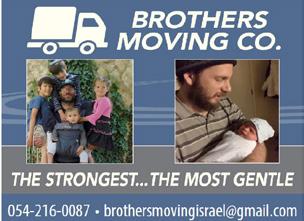
TO SPONSOR A SHIUR CONTACT
Chana Spivack - 050-229-4951 or donate online: https://www.ouisrael.org/donate/ou-israel-center/
THE WOMEN'S DIVISION YAMIM NORAIM
LEIL IYUN - MON. SEPT. 8
Sponsored In memory of our beloved Elisheva - ל"ז
on her third yahrzeit
The Frist Family
RABBI BREITOWITZ’S SHIUR - TUE. SEPT. 9
Dedicated anonymously for the refuah shleima of Oksana bat Bluma
RABBI TAUB'S WEEKLY THURSDAY
PARSHAT HASHAVUA SHIUR
Sponsored by The Jewish Legacy Foundation
RABBI MANNING’S SHIUR
Sponsored for the 2025 academic year
RABBI GOLDSCHEIDER’S SHIUR
Sponsored for the 2025 academic year
RABBI ADLER’S SHIUR
Sponsored for this academic year by the Frist family in memory of their beloved daughter and sister Elisheva Frist
RABBI SHAI FINKELSTEIN’S SHIUR
Sponsored for the 2024-2025 academic year by the Sondhelm and Wertenteil Families in memory of Mel & Sylvia David z”l








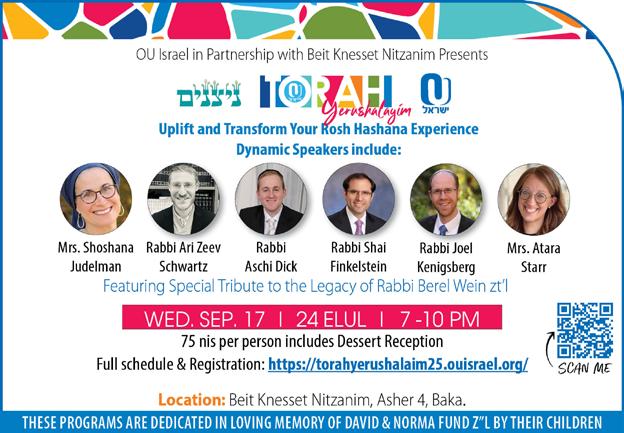

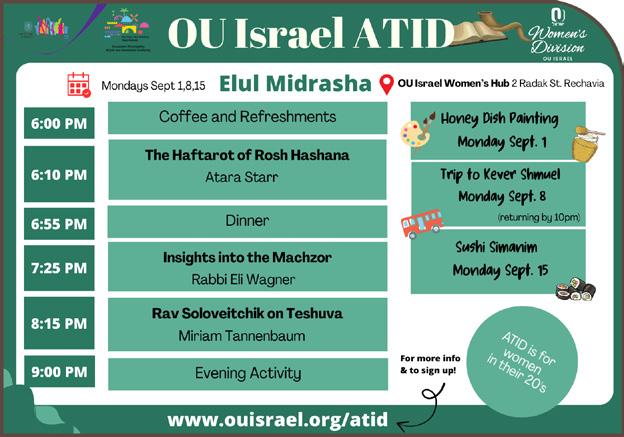
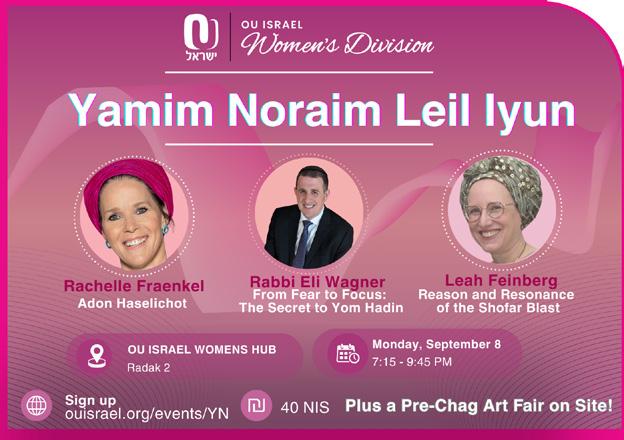

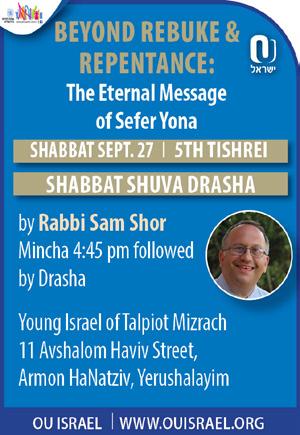
PLEASE NOTE ADVERTISING DEADLINES THROUGH THE CHAGIM:
SHABBAT SEP 12-13
No later than Monday morning, Sep 8th
ISSUE SHABBAT SEP 19-20 WHICH WILL ALSO INCLUDE ROSH HASHANA & SHABBAT SEP 26-27
Sunday morning, Sep 14th
ISSUE YOM KIPPUR / SHABBAT OCT 3-4 / ALL OF SUKKOT / SHABBAT OCTOBER 17-18
Wednesday morning, Sep 17th
ISSUE SHABBAT OCT 24-25
Monday morning, Oct 20th
For advertising contact Ita Rochel ttads@ouisrael.org or 02-560-9125










GEULAS YISRAEL
RABBI MOSHE TARAGIN
RAM YESHIVAT HAR ETZION
MAGGID SHIUR ALL PARSHA AND ALL DAF, OU.ORG
The story of the ben sorer u’moreh is vivid and unsettling. A wayward youth buys meat and wine, indulging in small excesses, only to be punished harshly and sentenced to death. Chazal note the stark contrast between his minor actions and the severity of his punishment. They explain that the Torah is not exacting retribution for his current crime, but judges him al sheim sofo—for the trajectory of his life as it is likely to unfold. It is deemed preferable to end this potentially criminal path before it fully manifests.
The story seems so harsh that Chazal say it likely never occurred. The halachic

requirements for prosecuting a ben sorer u’moreh were so exacting that cases were almost never brought to court. Though the halachot exist, they were rarely applied in practice. The ben sorer u’moreh section functions less as history and more as a moral lesson. It teaches about parental responsibility and the challenges of adolescent rebellion, showing how destructive tendencies sometimes must be addressed early, before they escalate into graver misdeeds.
The image of a ben sorer u’moreh was so evocative that Yirmiyahu chose it to describe Jewish disloyalty. Most Nevi’im employ a different metaphor—an unfaithful wife—to depict Israel’s betrayal of Hashem and His covenant. Hoshea (Perek 1 and Perek 4) and Yechezkel (Perek 16 and Perek 23) compare us to an unfaithful woman. Even Yirmiyahu adopts this powerful and painful image to convey religious and moral failure. Yet in one striking pasuk in Perek 5, Yirmiyahu chooses the metaphor of a ben sorer u’moreh to characterize Jewish rebellion:
"But this people has a stubborn and rebellious heart; they have turned aside and gone."
By casting our rebellions in the image of a ben sorer u’moreh, Yirmiyahu offers a nuanced perspective on our relationship with Hashem during moments of faltering. We are depicted not as an unfaithful woman, but as a ben sorer u’moreh: a people struggling to grow, assert independence, and find our path
while remaining bound to Hashem.
The actual ben sorer u’moreh is described as one who rebels against both mother and father, and both parents must bring the child to Beit Din. Halachically, if the mother is not alive, the child cannot be classified as a ben sorer u’moreh—one of the many parameters regulating the law’s application. In Eichah Rabbah, Petichta 24, the Midrash extends this idea to Jewish history: for Israel to be called a ben sorer u’moreh, the nation must rebel against both Father and Mother. Extending the metaphor, the Midrash portrays Hashem as our Father and the Torah as our Mother. Only by turning away from both Hashem and Torah can a people be considered a ben sorer u’moreh.
During the First Mikdash, we behaved like a ben sorer u’moreh, abandoning both our Father and Mother. We violated fundamental mitzvot, and our moral hypocrisy hollowed out our relationship with Hashem. In that era, we were indeed worthy of the severe title of a ben sorer u’moreh.
Throughout much of Jewish history, however, we did not warrant that nefarious title. At times we have strayed from our Father—Hashem—or from our Mother—the Torah—but rarely from both. Sometimes we have meticulously observed Torah law, yet our broader moral behavior, cultural assimilation, or historical commitments strained our relationship with Hashem. At other times, we have faltered in halachic practice while maintaining a steadfast connection to our Father through faith and belief, even if not fully expressed in strict adherence to halacha. We are considered a ben sorer u’moreh, truly rebellious, only when both Torah and
Diamonds, Gems, Precious Stones, Jade, Carvings, Fine Mineral Specimens, Etc.
*** Alan Sussman, “The Collector” *** 052-854-4504
Please call live, Text message or WhatsApp
Hashem are forsaken. Despite the trials and changes of Jewish history, we have rarely warranted such a designation. Ironically, by castigating his generation as behaving like a ben sorer u’moreh, Yirmiyahu was reminding future generations not to self-indict. It takes more than weakened halachic observance or a strained relationship with Hashem to be a ben sorer u’moreh. True rebellion requires turning away from both Father and Mother— and in our history, that double rebellion has been exceedingly rare.
The image of a ben sorer u’moreh introduces a second layer of nuance to the story of Jewish religious weakness. An unfaithful woman is driven by one of two forces. In some cases, her actions stem from lust and passion; in others, from a failure of loyalty, a lack of commitment, or sheer fickleness. Both are serious moral failings, and by comparing the Jewish people to an unfaithful wife, our Nevi’im cast Israel’s betrayals in starkly severe terms.
By contrast, a ben sorer u’moreh is driven by very different forces. As a young boy grows into a man, he naturally begins to form his own identity and assert his independence. This process of developing autonomy
is essential to growing up. Yet it also makes submission to authority—whether social norms, parental guidance, or communal expectations—more challenging. He disobeys his parents and consumes meat and wine in ways deemed socially inappropriate, not out of lust or indulgence, but because he cannot be constrained by external forces that limit his independence. He is not disloyal, nor driven by appetite or sensuality; he is exploring the boundaries of his selfhood and testing the limits of autonomy inherent in human growth.
The literal term sorer u’moreh captures this dynamic. Sorer means to veer—he seeks his own path in life, diverging from the routes laid out for him. Moreh, according to Rashi, indicates that he does not heed external moral guidance but instead evaluates ethical
decisions for himself. In other words, he is discovering independence, forging his own way, and developing his moral conscience. While his actions may sometimes take questionable forms, the underlying drive is a natural part of this stage of growth.
By framing Jewish rebellion as a ben sorer u’moreh rather than an unfaithful wife, Yirmiyahu softens the portrayal of our nation’s betrayals. As we settled Israel, we sought to define our own identity. In the desert, we were entirely dependent on heavenly bread and desert-sprung water. Entering the Land of Israel, we pursued a national identity of our own. The conditions were harsh, and it required immense strength and determination to confront the militant peoples of the Land.



In this context, fully accepting malchut shamayim, heaven, while building our inner fortitude and communal strength was no simple task. Essentially, we were adolescents seeking to understand ourselves, learning to navigate independence while submitting to divine authority. The image of a ben sorer u’moreh, though a severe rebuke, allows Yirmiyahu to frame our failures in a more nuanced and compassionate way: we were not irredeemably unfaithful, but struggling with the natural and universal challenge of forming a strong identity while embracing the sovereignty of heaven.
In many ways, this narrative is resurfacing in the modern State of Israel. To settle and defend the Land requires steadfast will and resolute courage. The original generation demonstrated their bravery by draining swamps, repelling attacks, and enduring the arduous early stages of Israeli history.
Our generation, too, is proving its inner faith and strength. Yet under such conditions, fully submitting to external authority is not always simple. Strong, self-sufficient people naturally find it more difficult to accept outside control. Israel demands strength, and not everyone is able to balance the fortitude required to thrive in the Land with the capacity to embrace the full codes of Torah and halacha. Sometimes we are not unfaithful or disloyal— we are simply a nation growing up under harsh conditions, striving to balance inner strength and independence with submission to Torah and divine authority. Framing the Jewish experience in terms of a ben sorer u’moreh allows us to view our struggles and our relationship with Hashem in a more measured and compassionate light.
Finally, the image of a ben sorer u’moreh reminds us that even in our rebellion, we remain Hashem’s children. Parshat Ki Teitzei also describes the consequences of an unfaithful wife: she is sent away from her husband. In fact, the parsha immediately preceding ben sorer u’moreh deals with a man who has two wives, and implies that at some stage the less beloved wife will be discharged from the household. One might expect a similar fate for the wayward son: that he, too, should be sent away, cast out like an unfaithful wife. Yet this is not an option. A child is always a child. The fates of parents and children are inextricably linked.
As the Torah writes, “
”— though this refers literally to bringing him to Beit Din, it carries a metaphorical resonance: parents must hold on to him firmly. He is not sent away. Even if the case were to reach Beit Din, parents would rarely, if ever, agree to

sacrifice their child over moral failings. The requirement for parents to bring their child to Beit Din ensures that the ben sorer u’moreh remains, rendering the story ultimately a cautionary tale rather than a historical reality.
The Gemara in Kiddushin (36a) cites Rabbi Meir:
"Rabbi Meir says: In either case, you are still called children, as it is written: ‘They are foolish children [but still children].’"
By referring to us as a ben sorer u’moreh, Yirmiyahu offers a deeply compassionate perspective on Jewish failure. Though the image may sound harsh and castigating, it pulses with Ahavat Yisrael: no matter how far we stray or how rebellious we behave, a child can never be severed from the parent. Even in our failings, our bond with Hashem—as our Father—remains unbroken.

Rabbi Taragin’s newest sefer entitled “To be Holy but Human: Reflections upon my Rebbe, Rav Yehuda Amital (Kodesh) is now available at: mtaraginbooks.com and in bookstores

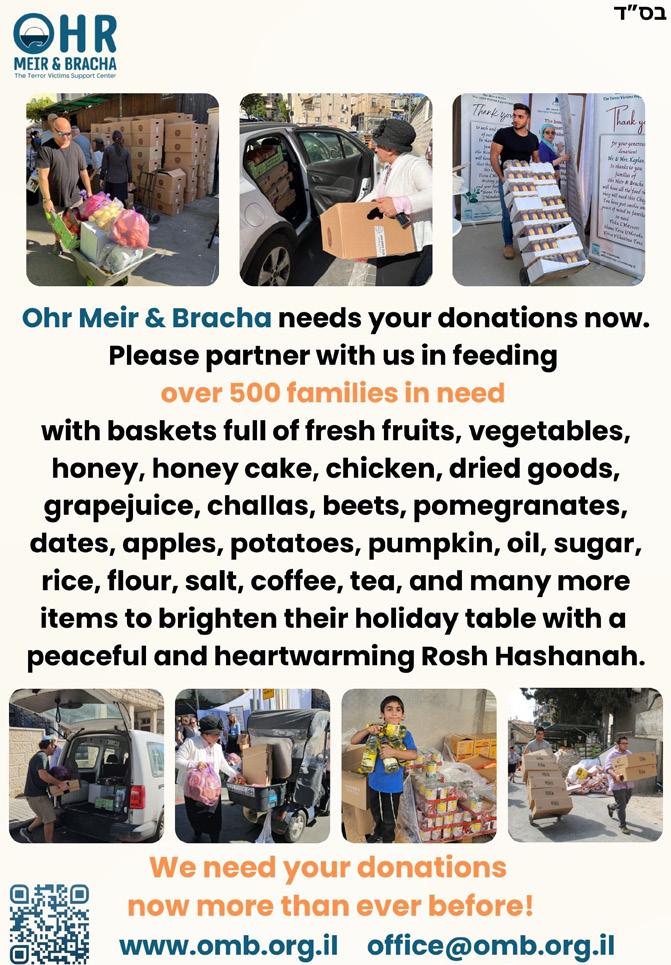

RABBI AARON GOLDSCHEIDER
RABBI AARON GOLDSCHEIDER EDITOR, TORAH TIDBITS RAV, THE JERUSALEM SHUL BAKA, JERUSALEM
In his final days as leader of the nation, Moshe continued disseminating the Divine law and guiding his people. It may come as a surprise that it is at this stage that Moshe communicated the laws of divorce.
Interestingly, the relationship between the Jewish people and God has been described in terms of a number of human relationships, however inadequate those portrayals may be. One of those is the human bond of marriage, and its potential severability through divorce.
The covenant at Sinai is often viewed by the Sages as a marriage, with the Torah as the marital contract.1 The Lubavitcher Rebbe, Menachem Mendel Schneerson, observed that we refer to God commanding us the mitzvot in our blessings with the term kideshanu. On the face of it, the word means “sanctified us,” but on a deeper level it evokes the bond of kidushin, betrothal. When men wrap tefillin around their arm and fingers, they utter the words of the prophet Hoshea: “I have betrothed you to Me forever” (Hosea 2:20). The Jewish people are wed to God.
1. The following remarks are based on Likutei Sichot, vol. 9, Ki Tetze 2, 143–151.
Can this marriage ever be terminated? The Talmud raises this very question:
Ten elders came and sat before [the prophet Yechezkel]. He said to them, “Repent!”
They said to him, “Does the master who sells his servant or the man who divorces his wife have any claim to them?”
The Holy One said to him, “Go tell them, ‘Where is your mother’s bill of divorce with which I sent her away? Or to which creditor have I sold you? It is for your sins that you have been sold and for your iniquities that your mother was sent away’” (Isaiah 50:1).2
In other words, God might have separated from the Jewish people on account of their sins, but He did not do so completely or irrevocably. The proof is that we have no writ of divorce.
At times, it can feel like we have been divorced. Exilic existence has forced us into subjugation and into living under the thumb of foreigners. The Lubavitcher Rebbe observed, however, that these nations are only God’s messengers. The very first mishnah in Gitin, the tractate dedicated to divorce law, tells us, “One who brings a get from beyond the sea must declare, ‘It was written in my presence and signed in my presence.’”3 The foreign powers that have defeated the Jewish people and ruled over her in exile are only God’s messengers, and they have brought no get. As agents, they 2. Sanhedrin 105a.
3. Mishnah, Gitin, 1:1.
possess no real power and cannot effectuate a divorce between the Jewish people and God on their own. The bill of divorce has never been, and will never be, delivered.
This reality is reflected in the words of this week’s parashah. “If a man married a woman... and he wrote her a bill of divorce ( sefer keritut ) (Deuteronomy 24:1). The Rebbe pointed out that keritut denotes absolute separation and sundering. The word sefer, however, calls to mind the sefer Torah, the Torah scroll “given to create peace in the world.”4 Halachah thickens this association by requiring that the get be written according to some of the rules for a sefer Torah, with ruled lines and length exceeding width.5 Unlike the Torah scroll, it must be written on a single sheet, but this too supports the idea of unity and wholeness. Why, then, does the Torah use a phrase that appears to be a contradiction in terms?
On the human plane, it instructs that the natural state of affairs between Jews is one of harmony. Holy matrimony sanctifies and deepens that connection. Gitin devotes its opening lengthy discussion to an unusual case, in which a get is being brought from abroad, rather than to the main body of relevant law. Rabbi Yehudah ha-Nasi organized the material this way, the Rebbe suggested, to signal that divorce has its origins in a “foreign place”—it does not come to us naturally. Although it is sometimes unavoidable and necessary, the existential bond remains in place.
Similarly, the metaphysical matrimony of God and the Jewish people is based on an
4. Mishneh Torah, Hilchot Megilah vaChanukah, 4:14.
5. Shulchan Aruch, Even ha-Ezer, 125:11–13.
inextinguishable love. The exile we suffer under may conceal that love, but it continues to burn all the same. The Lubavitcher Rebbe boldly claimed that keeping our faith while scattered across the globe in hostile conditions actually reflects a more profound love. Even when the relationship seems severely strained, so much so that one might mistake the outward separation for divorce, neither husband nor wife have given up on it. Perhaps Kidushin, the tractate about marriage, follows Gitin as an adumbration of God’s plan. Gitin is the spiritual exile that feels like divorce, and when God redeems us, the everlasting love represented by Kidushin will be manifest to all.
It is no accident that we learn about the laws of divorce at this time of year. The Rebbe observed that Parashat Ki Tetze is always read during the seven weeks of consolation following Tisha be-Av. Although the Temple is no more, the words sefer keritut remind us that God has not forsaken us. The flame of love yet burns. In addition, only our own unity and boundless love for one another will bring Him back in full glory to rebuild and inhabit His abode on earth once more.

Rabbi Goldscheider’s most recent OU Press Publication, “Torah United” on the weekly Parsha, can be ordered directly from Rabbi Goldscheider at aarong@ouisrael.org at a special price for Torah Tidbits readers.


www.yeshezra.org
Director: Menachem Persoff

We provide support for individuals facing challenges such as mental illness, disability, single motherhood, economic crisis, and recovery from substance addiction. We empower those left alone, ashamed, and lacking a support network by helping them regain stability and independence towards a brighter future.
do we do?
HEALTH Home visits, medicines, medical equipment, and counseling
BIG BROTHER PROGRAM Emotional support, guidance, and mentoring
MEALS & SHELTER Rent assistance, Shabbat and Holiday meals, and fixing appliances, among other services
FAMILY EVENTS Hachnasat Kallah & Bar/Bat Mitzvahs
Your compassionate soul can make a difference to those who stand alone. Please donate generously to advance our crucial work.
Website www.yeshezra.org

Bank Transfer Mercantile (17), Branch 642, A/C 79747843 (Send Asmachta for receipt**)
Checks Yesh Ezra, POB 31476, Romema, Jerusalem
Credit Card Sara – 077-820-0196/058-530-9161 (Sunday, Monday, Wednesday: 10:00-14:00)
*Tax benefit available for donations according to section 46a of the Israeli tax code*
YESH EZRA (R.A.580664647) | Tel: +972-77-820-0196 | Email:kerenchesed1@gmail.com P.O. Box 31476, HaMem Gimmel St. 5, Jerusalem 9136101
**Inquiries: Menachem Persoff 050-570-1067 | menpmp@gmail.com
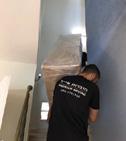








Ora askes:
My candidate recently ended a long relationship. He told me he’s ready to move on and hear new suggestions, but I’m not so sure. Each time I suggest someone, he finds vague reasons to reject the idea. It feels like he’s just looking for excuses to say no.

For Sale in Jerusalem
8 room cottage, 4.990.000 NIS For Sale in Efrat
Zayit: * 4 room apt. Stunning view. Elevator. 2,550,000 NIS
Zayit: * 3 room apt. next to the mall. 1,990,000 NIS
Tamar:*4 room apt.105m 2.95 NIS
Te'ena: * 6 room Cottage, 215m. Stunning view 4,750,000 NIS
Dagan: 5 room duplex garden apt. private entrance. Succah
balcony 3.850.000 NIS
: For Sale in Elazar
* Renovated 6 room apt. 170m on one floor. 2,490,000 NIS
Gabi- 0524588716
How can I really help him?
Aleeza answers:
When someone comes out of a long relationship, even if they say they’re ready, the heart often needs more time than the mind admits. Ending something significant leaves a space that doesn’t fill instantly. And sometimes, the fear of being hurt again shows up as a quick rejection.
First, let’s validate: he’s not wrong for feeling hesitant. This is how Hashem created the world when we lose something meaningful, we need a process of healing. The question is not just “Is he ready to date?” but “Is he ready to open his heart again?” Those are very different things.
So how can you help? Gently. With patience. Instead of only suggesting matches, invite him to reflect on what he learned from his last relationship. Ask: What worked well? What would you like to build differently next time? This helps shift his focus from “what I don’t want” to “what I truly want to create.”
You can also remind him: dating is not about finding someone perfect, it's about finding someone who is perfectly imperfect for you. If he’s using small flaws as reasons to reject, that may be fear of making the same mistake twice so he’s ruling out people
who may remind him of what didn’t work previously.
After making three suggestions and receiving three no’s, let him know that you don’t have any other relevant suggestions at this time. Let him know you’ve made thoughtful solid suggestions and you believe they have potential. Pause your suggestions and give him a moment to reflect. An endless supply of match suggestions will just prove you’re throwing spaghetti at the wall rather than making targeted suggestions.
May Hashem bless him with clarity, healing, and the courage to say yes when the right person comes along. And may you be blessed with spot on suggestions.
Aleeza
Want to set up your friends? Become their ambassadorjoin Shagririm Balev!




Founded in Israel in 2019 and led by Rav Rimon, Shagririm Balev - a social online matchmaking initiative - has taken the dating scene by storm. With over 10,000 candidates and 3,000 Ambassadors, in Israel and the US, Shagririm Balev is averaging a Wedding every 2 days! en.shagririm.org.il 0585323242



GARDEN PARADISE IN KATAMON FOR SALE PEACEFUL, BEAUTIFUL, GARDEN DUPLEX APARTMENT 124.5 SQM ON TWO LEVELS, 4.5 BEDROOMS, 3 FULL BATHS, PRIVATE GARDEN IN TABU FULL OF FRUIT TREES, PRIVATE PARKING, ELEVATOR, MAMAD, EXCELLENT CONDITION.
ASKING PRICE: NIS 8,150,000

QUAINT 1 BDRM ALSO FOR SALE
ADDITIONAL 2 ROOM APT FOR SALE DIRECTLY ABOVE THE GARDEN APT! BRIGHT AND COMPACT 34 SQM., 3 AIR DIRECTIONS, INCLUDES MAMAD, SUKKAH BALCONY, ELEVATOR, PRIVATE HEAT, AND A/C.
ASKING PRICE: NIS 2,150,000
Given this week by Rabbi Chanoch Yeres Beit Knesset Ohel Yitzchak, Rechov Washington 12 at 5:15pm








Celebrating the thousands of Olim who are making Aliyah this summer!
May - September 2025 | nbn.org.il/flights
Are you a doctor or medical student thinking of Aliyah? Join us to discuss what Aliyah can look like for you!
September 8, 2025 - Toronto | September 9, 2025 - Montreal
This is your chance to meet with Nefesh B’Nefesh and get answers to your Aliyah questions.
Monday, September 8, 2025 | Brooklyn & West Hempstead
Join us for a conference packed with dynamic, tailor-made sessions to help you optimize your finances.
Sunday, September 14, 2025 | NBN Aliyah Campus JLM
Shop for Chagim from a wide selection of delicious foods, artisanal crafts, and unique products crafted by talented Olim.
Wednesday, September 17, 2025 | NBN Aliyah Campus JLM
Supplement your existing Hebrew skills with the words and insights you need to survive & thrive in Israel.
September - November 2025 | Online
www.nbn.org.il/all-events




As our courageous and resilient soldiers continue to defend and protect the State of Israel, Nefesh B'Nefesh, Friends of the IDF (FIDF), and Jewish National Fund - USA are committed to giving back. We





Two week have passed since we received the bitter news of Rabbi Berel Wein zt”l’s passing, and I still struggle to comprehend that he is no longer with us.
Over the past three years I have had the distinct privilege of serving as Rav of Beit Knesset Hanassi, alongside Rabbi Wein, who graciously stepped into the role of Senior Rabbi when I joined the community. Before accepting this position I had never met him in person, though like so many, I had long admired him from afar. He was a legend in the Jewish world - his books and audio lectures known in every corner of the globe. But meeting the man himself was an experience of an entirely different order.
I vividly recall my trial Shabbat at the




at the back, was Rabbi Wein. Once I became the rabbi, it was always daunting to speak in his presence, yet he listened with the same attentiveness and respect as though he had never heard the material before. Afterwards, he would offer a warm comment that conveyed to the entire audience that my words carried weight.
What struck me most was his warmth and humility. For a man of his stature, it could not have been easy to relinquish the pulpit to a young rabbi more than fifty years his junior. Yet if he felt any discomfort, he never showed it. On the contrary - he treated me as an equal colleague from the very first moment. If a congregant approached with a halachic question, he would direct them to me. When the gabbai asked who should receive a special aliyah or honor, he pointed my way. Before the first night of Selichot, when the shul would be awaiting words of chizzuk from its rabbi, he simply turned to me and said: “You’re the Rav - you do it.”
Some of my most cherished memories of Rabbi Wein are not from his words, but from his simple gestures. After I delivered a drasha on Shabbat morning, he would often catch my eye, nod approvingly, and give a discreet thumbs-up. He knew exactly
how much that meant. In his final months, when he was rarely able to attend shul during the week, he would take my hand on Motzaei Shabbat, wish me Shavua Tov, and hold on tight for a moment - as if to say, “You’re doing a great job. Keep it up.” Occasionally he would articulate it, but the silent encouragement of that handshake said it all. I will miss it terribly.
For several weeks before his passing, Rabbi Wein was absent from shul due to his declining health. But walking in this past Shabbat and seeing his seat now permanently empty, was especially painful. As I took my seat, alongside where he would sit, I began to tear up.
Chazal teach us that even the “casual conversation” of Torah scholars carries meaning. With Rabbi Wein, there was hardly any casual talk at all; every word was measured, every phrase imbued with decades of Torah insight and life wisdom. I treasure the Friday nights I accompanied him on the walk home from shul. I remember once as we passed two women on the street, one whispered in awe to the other: “Was that Rabbi Wein?” Yes, it was. A giant in our midst who graced our community, our streets and our lives. And I had the privilege to walk beside him.
Rabbi Wein leaves behind a void that can never truly be filled. But we will do our utmost to remember him by living our lives in the light of his teachings: to recognize our place in the great sweep of Jewish destiny, to draw on the wisdom of the past in order to shape the future, and to hold fast - in faith and conviction, as he was so fond of reminding us - that “it will yet be good.”
Yehi zichro baruch.


For many more opportunities across Jerusalem and Israel, please don’t hesitate to reach out















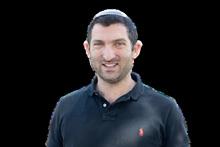

OU ISRAEL FACULTY

Hazal said of the friends of Iyov: ארבח וא אתותימ וא בויאד ירבחכִּ - Either a person has friends like the friends of Iyov, or death.1 What was it about the friends of Iyov that qualified them as the ultimate paradigm of friendship? After all, not only do they seem to have failed in their mission of comforting Iyov, in the final event they are even accused of incriminating him! How could such friends serve as a model for us to emulate, friends without whom death would be preferable to life?
The teaching of Hazal cited above comes at the conclusion of a discussion regarding the arrival of Iyov’s friends to comfort him. The friends are described in the text as arriving jointly to console him, even though each had left from his own home in a location remote from the others. While today arranging such a meeting is as simple as sending a quick text message, in biblical times this was no small feat. The gemara explains that the friends had a system whereby they could remain aware of any change in the welfare of the others; some say they each had a crown on which the faces of the three others were engraved, and any change in their well-being was reflected in the face of the affected one, while others suggest
1. Bava Batra 16b
that each had three trees, each representing one of the friends, and if one withered they knew who was suffering. At any such sign, the friends gathered to offer support to the afflicted one. Thus Iyov’s friends were able to assemble and arrive together to console him.
The Maharal explains the two opinions of the Sages to indicate that the bond among these four friends was all-encompassing. The suggestion of the crown reflects a bond that supersedes the physical realm, while the suggestion of the trees represents that the friends were united in the natural world, by the earth in which they were planted.2 This friendship, which existed in both the upper and lower realms, is the type of friendship we can’t live without - peers who not only sympathize but empathize, and are willing to drop everything at a moment’s notice to be physically, intellectually and emotionally present in one’s time of need.
The midrash teaches that in consequence of their willingness to drop everything to comfort Iyov in his state of mourning, Iyov’s friends were spared from the places in Gehinom that had been designated for them, merited to have Ruach HaKodesh rest upon them
2. Chiddushei Aggadot Bava Batra 16b
and to have their names commemorated in Tanach.3 Rav Chaim Shmulevitz explains that the quality of bearing the burden of someone else’s suffering as Iyov’s friends did is an especially worthy character trait, one that is shared by none other than Mashiach himself. The gemara relates that Mashiach is to be found among those suffering from disease, doing all within his power to ease their pain. The Redeemer of the Jewish people must identify with their suffering.4
Although the friends of Iyov were not able to comfort him with their philosophical arguments, they remained present and shared his pain. At the climax of the sefer, Hashem commanded the friends to offer an ‘Olah to atone for their erroneous arguments, and asserted that Iyov would pray on their behalf, despite their having wronged him. Rav Soloveitchik sees this prayer as evidence of the change wrought upon Iyov by his suffering - at the outset, Iyov’s concern was only for his own family, reflected in the ‘Olah offering he brought to atone for his children. Through his experiences, Iyov learned to rise above his individual concerns and identify with the pain and anguish of the community, to look outward and experience a sense of true communion with those in need. We, who pray in the plural form, learn from Iyov’s transformation.5
May we merit to have and to be friends such as the friends of Iyov, and hasten the coming of Mashiach as we identify and show solidarity with the suffering of those in our community, offering our heartfelt prayers
3. Kohelet Ra bbah 7
4. Sichot Mussar p.78
is reluctant to send Yishmael away and Yitzchak seeks reconciliation with Yishmael and seeks to bless Esav.
5. Kol Dodi Dofek II: Iyov on
6th Aliya (25:1-11) Avraham marries Keturah; they have 6 sons. All that Avraham has goes to Yitzchak; these are sent eastward with gifts. Avraham dies at age 175; he is buried by Yitzchak and Yishmael in Ma’arat Hamachpelah. Yitzchak is blessed by G-d: he lives in Beer L’chai Roi. The transition from Avraham to Yitzchak is complete. While G-d has been a silent partner in this parsha, here He completes the generational transfer – He blesses Yitzchak. The Jewish people will be Yitzchak and not Yishmael.
Mrs. Leah Feinberg is a master educator who taught at the SKA High School for Girls in Hewlett for twenty-one years, also serving as Tanach Department chairperson and New Teacher Mentor. Leah is currently on the faculty of the OU Israel Center and has taught in all three cycles of the OU Women’s Initiative Nach Yomi program
In the OU Women’s Initiative Nach Yomi series, currently in its third cycle, women scholars deliver a daily shiur on the books of Prophets (Neviim) and Writings (Ketuvim) at the pace of a chapter a day. Shiurim are geared toward learners of all levels who would like to participate in the twoyear Nach Yomi study cycle. Visit the OU Women’s Initiative to register for additional content.
7th Aliya (25:12-18) The generations of Yishmael are enumerated. Yishmael dies. His descendants dwell from Egypt to Assyria. Yishmael’s story is brief. He has numerous and powerful offspring. The brevity is interested the Jewish length. echoes tions woman and began father’s that his icant the
•
DELIVERY

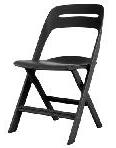

BY RABBI
R av, Beit Knesset
When Avraham addresses the people of Cheit, trying to “Ger V’Toshav Anochi Eimachem” (23:4) “A Stranger and This seems to be a contradiction. If one is a stranger than is no longer a stranger. What did Avraham mean?
The Magid of Dubno (Jacob ben Wolf Kranz 1741-1804) this tense situation in order to, both, state his truth and be said, on the one hand, “I am a Resident’ due to G-d’s promise need your agreement to purchase a plot. In other words, Avraham “strangers”, while they understood him as saying that “they”


The peace was kept, and Avraham remained true to his Shabbat Shalom





Join us for an evening of celebration in support of The Michael Levin Base a non-profit that provides physical and emotional support to Lone Soldiers and Bnot Sherut
The Rise of Global Antisemitism Panel Discussion
The Jerusalem Theater, Henry Crown Theater, David Marcus St. 20 Tuesday, September 16th V
Doors open - 5:45 Program starts - 6:30

Mike Huckabee
Community Volunteer Award
Howie Rosenblum
L
Master of Ceremonies
Andrea Finger
Light dairy buffet after the program
This evening is made possible in part by a generous donation by Anne and Arthur Gober


U.S. Ambassador to Israel Special Guest Speaker

Michael Oren Writer and former
Israeli Ambassador to the United States
Opening remarks

Eylon Levy
Former Israeli Government Spokesperson

Rabbanut Jerusalem Mehadrin Fleur HassanNahoum
Israel Special Envoy for Trade & Innovation

Adir Schwarz Deputy Mayor of Jerusalem

Matti Friedman Award winning Author and journalist

Adults as well as children are overwhelmed with emotions when they hear about a terrorist attack. When they become more frequent, the feeling of uncertainty and loss of control can create much anxiety. There are certain guidelines to keep in mind the questions they ask. Stay focused. necessary to elaborate or get sidetracked politics or other similar situations. tions should be given in an age appropriate manner. Just like your rules are age priate your discussions should be Having more detailed, graphic conversations is more appropriate with an 18 than old.
Michal Silverstein, MS
Dear T.R.
Thank you for asking this very relevant and timely question.
Michal Silverstein, MS
When getting a child ready for the school year, there are various checklists. It’s a transition, and it takes a while for both parents and kids to acclimate to the new school year routine.
the process. It can be a fun family activity for siblings to help each other.
Implementing a routine is important on school nights. Having kids on a consistent sleep/wake schedule is essential for them to be well rested. It will allow them to be present and focused during a long day of learning.

For Sale:
25 Ben Maimon, 4 rooms, 113m, 2 bathrooms, porch, 1st floor, elevator, 6.2 million NIS
Smadar 050-3114040 // 02-642-4329
smadi_bida@walla.co.il
70 TORAH TIDBITS 1514 / EMOR
It’s a good idea to get your child/children on board with back to school preparations. Ask them to make a list of specific items they may want or need and decide together what is relevant. As kids get older they can buy some of their own school supplies, which will encourage them to take on some of the responsibility. The practical or logistical preparation may seem overwhelming especially when there are many school age children at home. Once you’ve purchased the books, school supplies and new accessories, enlist the help of your child/ older children to help get the backpacks ready and books and notebooks covered and labelled. Allow your child to really be part of

Another important aspect to consider is mealtime. In the summer kids tend to snack and eat whenever they want as schedules are more flexible. When school time arrives, it’s really important to have healthy well rounded meals planned as well as healthy snacks available for school and after school. Kids generally come home after a long day, tired and worn out so it’s good to have cut fruits or vegetables at the ready or anything else with some nutritional value! Some kids may even want a meal when they get home.
It’s important to keep an eye out emotional and physical signs of If your child looks sad, has crying becomes fearful or angry or is experienc ing changes in sleeping and eating he may need extra help processing rent state of events. Be aware of behavioral changes.
Regarding your own emotional important to model emotions in front children. Seeing you express your will allow your child to do the same. being said, there is also a limit. You
Technology has a strong influence on children. As your child enters the new school year you should decide how much screen time is allowed on a school night and on the weekend. You should have parent apps or filters in place to reinforce what was agreed upon. It’s preferable for your child to be off of any device an hour before bedtime and not to have screens in bed.
Finally, it’s important to have conversations with your kids regarding how they’re feeling about the upcoming school year. Make time to connect, ask what they’re looking forward to. If there’s something they’re worried about, concerned about? What can make it easier for them?
It’s important to give space for the unknown and doubts as school begins. And for them to know there’s an address for them to express their feelings and emotions. Project confidence in your child and in their ability to navigate this new step!
If you’re having a hard time getting into routine, your child missed the bus, or the food wasn’t ready when they got home, give yourself some grace. It takes time to switch into school mode.
Be’hatzlacha
Feel free to send in any parenting questions you may have to parenting@ouisrael.org (Details will be changed to preserve anonymity).
Michal Silverstein has a MS in educational psychology and counseling. She facilitates parenting workshops in and around Jerusalem and maintains a private practice.
Struggling to find the right apartment in Jerusalem?

Whether you’re in Israel or abroad, I’ll assist you in finding a home that truly fits – location, size and budget.
Local knowledge ! Professional service!
Real results !
Nahum Glatzer 050-7225694

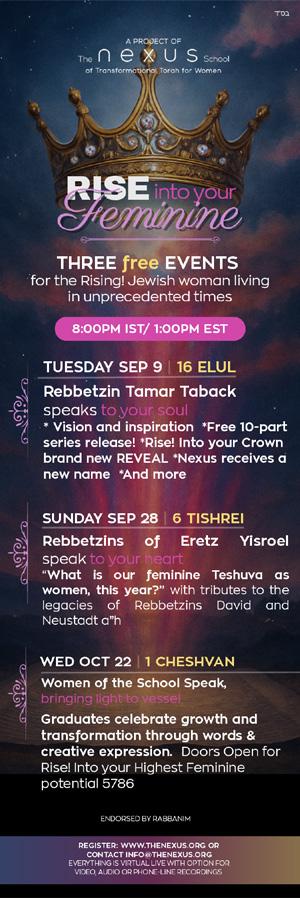

Walking down King George St. in Jerusalem and want a cold bottle of water? Come help yourself to a bottle at 52 King George.
In loving memory of Yoni’s wife Tziporah a"h, a true Eishes Chayil, always full of chessed, kindness and laughter, and brought life and strength to so many people, that she touched! She was like Aron, who loved peace and pursued peace.

Yoni thanks Hashem for having the opportunity of having Tziporah in his life, to learn of her caring, patience and happiness, to overcome her challenges. May Tziporah's Neshama be a light onto the world, in a time of darkness, and may her Neshama shine to Gan Eden. Yoni misses Tziporah with tears in his eyes, as Hashem gave him a gift, a crown jewel, now he returns her to Hashem. With thanks and Toda. Love, Yoni
To help refill the supplysend tax deductible donations for Be’er Tziporah a"h Bottled Water Gemach to Chabad of RechaviaRabbi Yisroel Goldberg email Rabbi@JerusalemChabad.org 02 800-1717
www.JerusalermChabad.org/DonateShekels


BY
NCSY ISRAEL

Amidst all the mitzvot outlined in this week’s parsha, we encounter one that appears almost too intuitive to require mention:
“When you build a new house, you shall make a fence for your roof, so that you do not bring bloodguilt on your house if a fallen one falls from it.” (Devarim 22:8)
Isn’t it logical that one should not create a situation in which someone could easily fall? If no word or even letter in the Torah is irrelevant or misplaced, why do we need to be told such an obvious idea?
The Slonimer Rebbe teaches that this week’s parsha is always read in the month of Elul to teach us something vital as we prepare ourselves for the upcoming Chaggim. Elul is an introspective time in which we set goals for ourselves, reflect on the past year, and evaluate how we can reach our fullest potential in the coming one. Oftentimes, the list of goals and character traits we wish to improve spans
JESIN
Canadian Physician
Over 10,000 britot!
From Toronto, Canada, now residing in Bet Shemesh Serving Jerusalem, the Mercaz, and all places between! www.DrJesin.com | 052-399-4313

pages, moving from one lofty aspiration to another. While this influx of inspiration is an important part of growth, these goals are not always tangible, and setbacks are inevitable.
This is precisely why, when we look more closely at the pasuk, we are struck by the phrasing: “If a fallen one falls from it.” The Slonimer Rebbe points out that this indicates a fall is inevitable, since they are already a “fallen one.” During growth, we might find ourselves building a “new house,” a new version of ourselves so far removed from where we presently are that we rise too quickly. Without a “fence” to safeguard us, we inevitably fall.
Anyone who has experienced such a setback on their path to growth might even ask, “If the fallen one will fall anyway, why even try?” This is precisely why this pasuk must be mentioned during Elul. Lofty goals are beautiful, but they can also be elusive. This Elul, as we set personal goals, we should make them attainable and establish safeguards against the inevitable return of old habits. With this approach, instead of stumbling, we can keep moving forward, step by step, toward lasting growth.
Shabbat Shalom.

ZVI FISHER 10TH GRADE, JERUSALEM
In this week’s parsha, Parshat Ki Teitzei, we encounter many mitzvot; in fact, it’s the parsha with the most mitzvot in the Torah. One mitzvah that seems minor is Shiluach
HaKen-sending away the mother bird before taking her young.
What’s surprising is that the Torah promises a reward for this mitzvah: longevity. There is only one other mitzvah for which the Torah explicitly mentions a reward: Kibbud Av Va’Em-honoring one’s parents. At first glance, these mitzvot seem completely different. As the Gemara in Kiddushin teaches, Kibbud Av Va’Em is a tremendously difficult and demanding mitzvah, while Shiluach HaKen is relatively easy. So why do they share the same reward?
The answer lies in their unexpected nature. Many mitzvot are planned and prepared for in advance, but Kibbud Av Va’Em and Shiluach HaKen often appear spontaneously. A person may be walking down the road and suddenly see a bird’s nest, or suddenly face a situation requiring immediate respect and care for a parent.
The month of Elul is a time to prepare our hearts for Rosh Hashanah. Just as we examine our deeds and refine our intentions this month, these mitzvot teach us to respond to life’s unexpected opportunities with care, respect, and joy. They test our sensitivity, spontaneity, and love of Hashem. By fulfilling them wholeheartedly, we not only merit their reward but also strengthen our daily commitment to Torah and mitzvot.


